Stabilization Clauses in International Business: Presumptions vs Realities
VerifiedAdded on 2019/12/17
|25
|9249
|421
Essay
AI Summary
This collection of articles from various academic journals and publications explores topics related to international business, trade, law, and economics. The articles delve into issues such as foreign direct investment, resource nationalism, public-private partnerships, fiscal stabilization in oil and gas contracts, and supply chain management. Notable authors include Frank, Jasimuddin, Kim, Mansour, McGovern, Orefice, Prihandono, Ray, Ritschl, Saurugger, Sewalk, Valderrama, Wellock, and Zhang. This diverse range of articles provides valuable insights into contemporary issues affecting global business and trade.
Contribute Materials
Your contribution can guide someone’s learning journey. Share your
documents today.
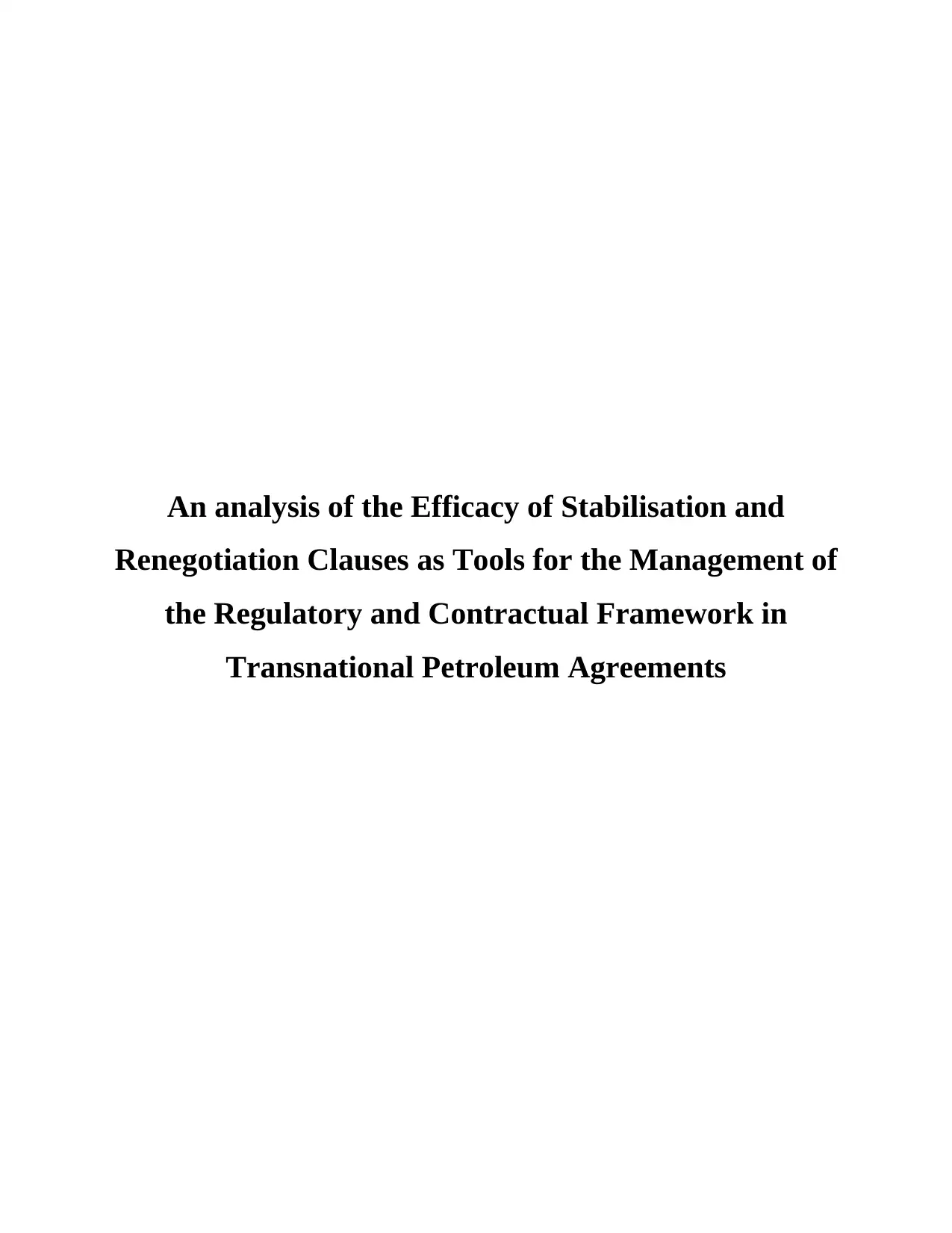
An analysis of the Efficacy of Stabilisation and
Renegotiation Clauses as Tools for the Management of
the Regulatory and Contractual Framework in
Transnational Petroleum Agreements
Renegotiation Clauses as Tools for the Management of
the Regulatory and Contractual Framework in
Transnational Petroleum Agreements
Secure Best Marks with AI Grader
Need help grading? Try our AI Grader for instant feedback on your assignments.
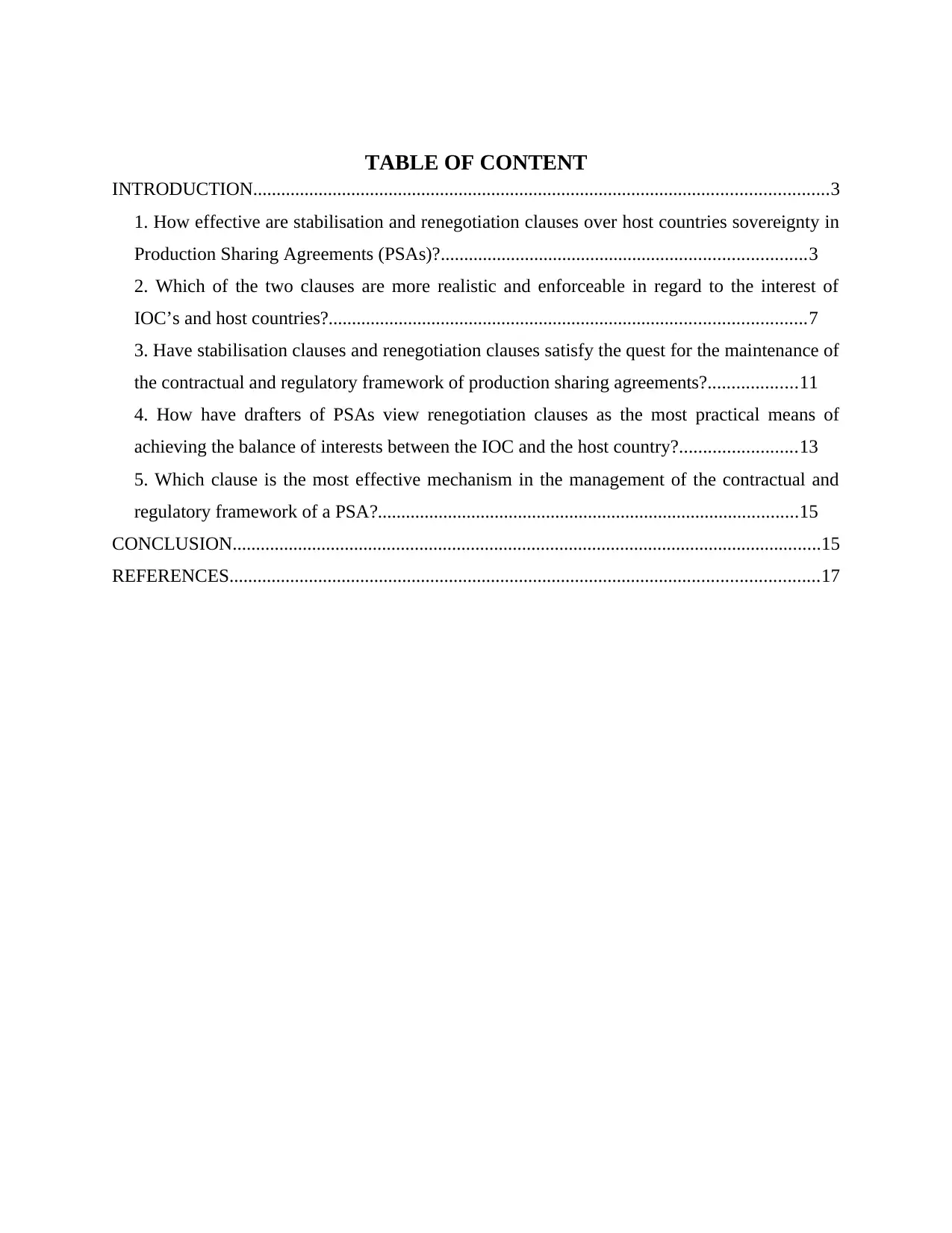
TABLE OF CONTENT
INTRODUCTION...........................................................................................................................3
1. How effective are stabilisation and renegotiation clauses over host countries sovereignty in
Production Sharing Agreements (PSAs)?..............................................................................3
2. Which of the two clauses are more realistic and enforceable in regard to the interest of
IOC’s and host countries?......................................................................................................7
3. Have stabilisation clauses and renegotiation clauses satisfy the quest for the maintenance of
the contractual and regulatory framework of production sharing agreements?...................11
4. How have drafters of PSAs view renegotiation clauses as the most practical means of
achieving the balance of interests between the IOC and the host country?.........................13
5. Which clause is the most effective mechanism in the management of the contractual and
regulatory framework of a PSA?..........................................................................................15
CONCLUSION..............................................................................................................................15
REFERENCES..............................................................................................................................17
INTRODUCTION...........................................................................................................................3
1. How effective are stabilisation and renegotiation clauses over host countries sovereignty in
Production Sharing Agreements (PSAs)?..............................................................................3
2. Which of the two clauses are more realistic and enforceable in regard to the interest of
IOC’s and host countries?......................................................................................................7
3. Have stabilisation clauses and renegotiation clauses satisfy the quest for the maintenance of
the contractual and regulatory framework of production sharing agreements?...................11
4. How have drafters of PSAs view renegotiation clauses as the most practical means of
achieving the balance of interests between the IOC and the host country?.........................13
5. Which clause is the most effective mechanism in the management of the contractual and
regulatory framework of a PSA?..........................................................................................15
CONCLUSION..............................................................................................................................15
REFERENCES..............................................................................................................................17
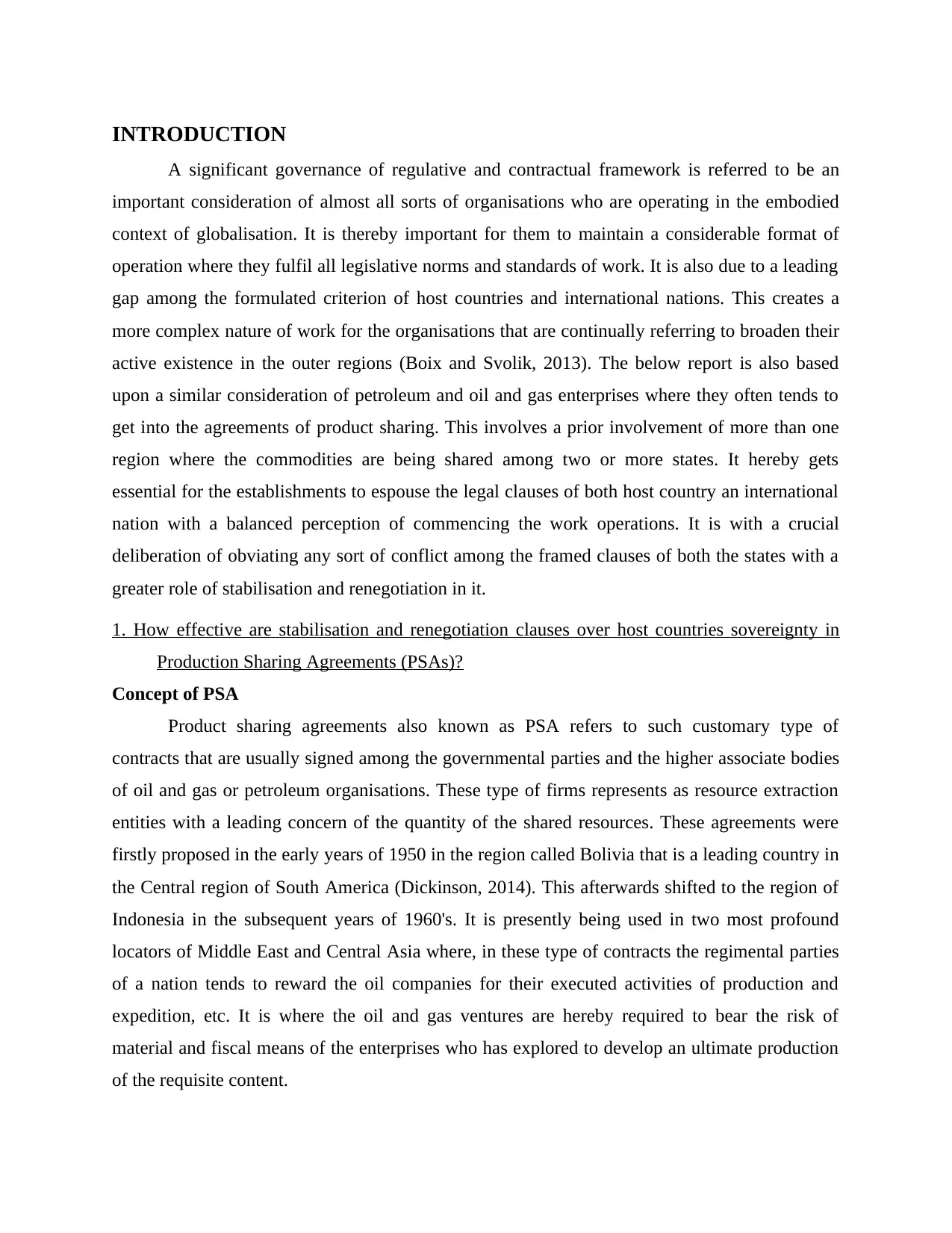
INTRODUCTION
A significant governance of regulative and contractual framework is referred to be an
important consideration of almost all sorts of organisations who are operating in the embodied
context of globalisation. It is thereby important for them to maintain a considerable format of
operation where they fulfil all legislative norms and standards of work. It is also due to a leading
gap among the formulated criterion of host countries and international nations. This creates a
more complex nature of work for the organisations that are continually referring to broaden their
active existence in the outer regions (Boix and Svolik, 2013). The below report is also based
upon a similar consideration of petroleum and oil and gas enterprises where they often tends to
get into the agreements of product sharing. This involves a prior involvement of more than one
region where the commodities are being shared among two or more states. It hereby gets
essential for the establishments to espouse the legal clauses of both host country an international
nation with a balanced perception of commencing the work operations. It is with a crucial
deliberation of obviating any sort of conflict among the framed clauses of both the states with a
greater role of stabilisation and renegotiation in it.
1. How effective are stabilisation and renegotiation clauses over host countries sovereignty in
Production Sharing Agreements (PSAs)?
Concept of PSA
Product sharing agreements also known as PSA refers to such customary type of
contracts that are usually signed among the governmental parties and the higher associate bodies
of oil and gas or petroleum organisations. These type of firms represents as resource extraction
entities with a leading concern of the quantity of the shared resources. These agreements were
firstly proposed in the early years of 1950 in the region called Bolivia that is a leading country in
the Central region of South America (Dickinson, 2014). This afterwards shifted to the region of
Indonesia in the subsequent years of 1960's. It is presently being used in two most profound
locators of Middle East and Central Asia where, in these type of contracts the regimental parties
of a nation tends to reward the oil companies for their executed activities of production and
expedition, etc. It is where the oil and gas ventures are hereby required to bear the risk of
material and fiscal means of the enterprises who has explored to develop an ultimate production
of the requisite content.
A significant governance of regulative and contractual framework is referred to be an
important consideration of almost all sorts of organisations who are operating in the embodied
context of globalisation. It is thereby important for them to maintain a considerable format of
operation where they fulfil all legislative norms and standards of work. It is also due to a leading
gap among the formulated criterion of host countries and international nations. This creates a
more complex nature of work for the organisations that are continually referring to broaden their
active existence in the outer regions (Boix and Svolik, 2013). The below report is also based
upon a similar consideration of petroleum and oil and gas enterprises where they often tends to
get into the agreements of product sharing. This involves a prior involvement of more than one
region where the commodities are being shared among two or more states. It hereby gets
essential for the establishments to espouse the legal clauses of both host country an international
nation with a balanced perception of commencing the work operations. It is with a crucial
deliberation of obviating any sort of conflict among the framed clauses of both the states with a
greater role of stabilisation and renegotiation in it.
1. How effective are stabilisation and renegotiation clauses over host countries sovereignty in
Production Sharing Agreements (PSAs)?
Concept of PSA
Product sharing agreements also known as PSA refers to such customary type of
contracts that are usually signed among the governmental parties and the higher associate bodies
of oil and gas or petroleum organisations. These type of firms represents as resource extraction
entities with a leading concern of the quantity of the shared resources. These agreements were
firstly proposed in the early years of 1950 in the region called Bolivia that is a leading country in
the Central region of South America (Dickinson, 2014). This afterwards shifted to the region of
Indonesia in the subsequent years of 1960's. It is presently being used in two most profound
locators of Middle East and Central Asia where, in these type of contracts the regimental parties
of a nation tends to reward the oil companies for their executed activities of production and
expedition, etc. It is where the oil and gas ventures are hereby required to bear the risk of
material and fiscal means of the enterprises who has explored to develop an ultimate production
of the requisite content.
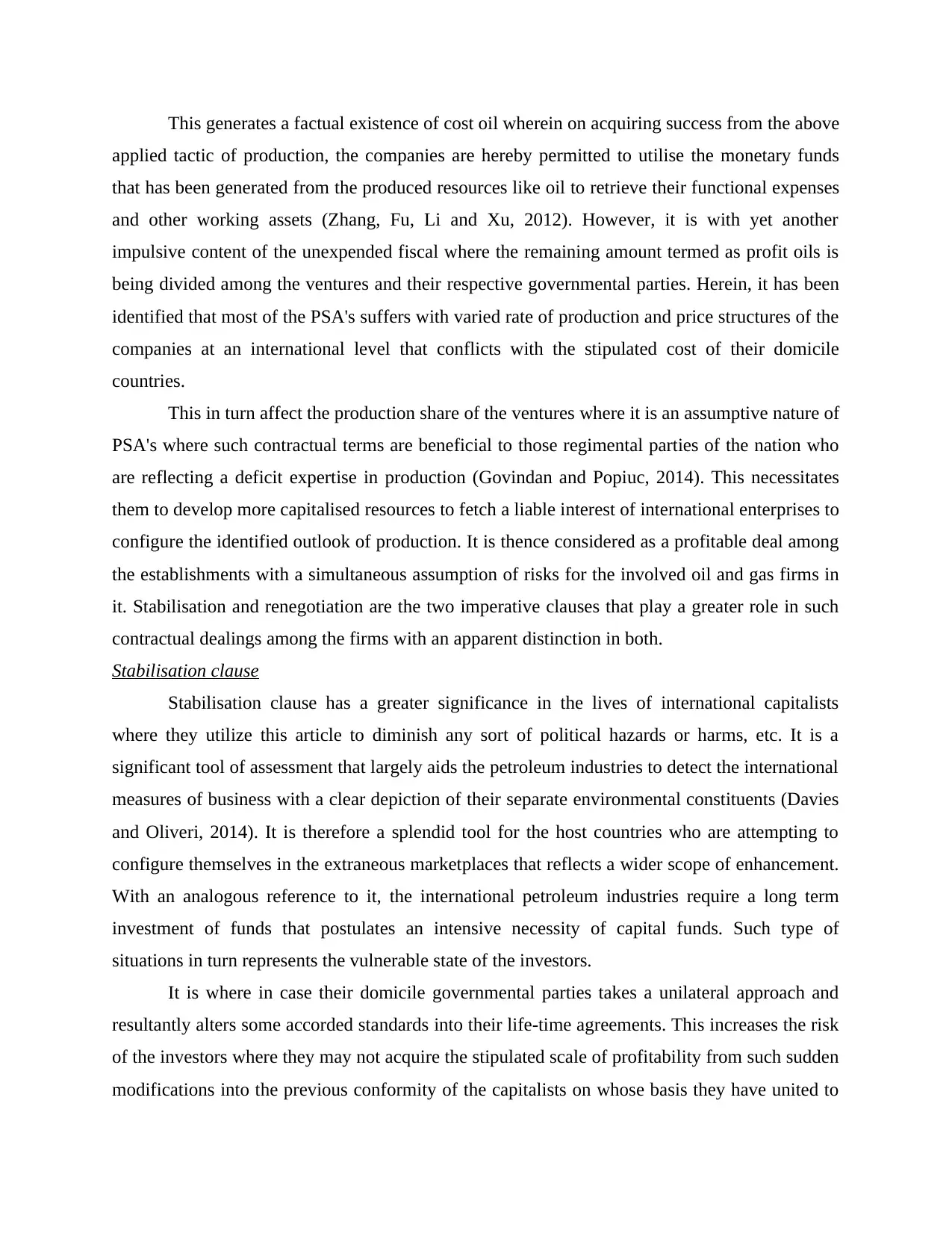
This generates a factual existence of cost oil wherein on acquiring success from the above
applied tactic of production, the companies are hereby permitted to utilise the monetary funds
that has been generated from the produced resources like oil to retrieve their functional expenses
and other working assets (Zhang, Fu, Li and Xu, 2012). However, it is with yet another
impulsive content of the unexpended fiscal where the remaining amount termed as profit oils is
being divided among the ventures and their respective governmental parties. Herein, it has been
identified that most of the PSA's suffers with varied rate of production and price structures of the
companies at an international level that conflicts with the stipulated cost of their domicile
countries.
This in turn affect the production share of the ventures where it is an assumptive nature of
PSA's where such contractual terms are beneficial to those regimental parties of the nation who
are reflecting a deficit expertise in production (Govindan and Popiuc, 2014). This necessitates
them to develop more capitalised resources to fetch a liable interest of international enterprises to
configure the identified outlook of production. It is thence considered as a profitable deal among
the establishments with a simultaneous assumption of risks for the involved oil and gas firms in
it. Stabilisation and renegotiation are the two imperative clauses that play a greater role in such
contractual dealings among the firms with an apparent distinction in both.
Stabilisation clause
Stabilisation clause has a greater significance in the lives of international capitalists
where they utilize this article to diminish any sort of political hazards or harms, etc. It is a
significant tool of assessment that largely aids the petroleum industries to detect the international
measures of business with a clear depiction of their separate environmental constituents (Davies
and Oliveri, 2014). It is therefore a splendid tool for the host countries who are attempting to
configure themselves in the extraneous marketplaces that reflects a wider scope of enhancement.
With an analogous reference to it, the international petroleum industries require a long term
investment of funds that postulates an intensive necessity of capital funds. Such type of
situations in turn represents the vulnerable state of the investors.
It is where in case their domicile governmental parties takes a unilateral approach and
resultantly alters some accorded standards into their life-time agreements. This increases the risk
of the investors where they may not acquire the stipulated scale of profitability from such sudden
modifications into the previous conformity of the capitalists on whose basis they have united to
applied tactic of production, the companies are hereby permitted to utilise the monetary funds
that has been generated from the produced resources like oil to retrieve their functional expenses
and other working assets (Zhang, Fu, Li and Xu, 2012). However, it is with yet another
impulsive content of the unexpended fiscal where the remaining amount termed as profit oils is
being divided among the ventures and their respective governmental parties. Herein, it has been
identified that most of the PSA's suffers with varied rate of production and price structures of the
companies at an international level that conflicts with the stipulated cost of their domicile
countries.
This in turn affect the production share of the ventures where it is an assumptive nature of
PSA's where such contractual terms are beneficial to those regimental parties of the nation who
are reflecting a deficit expertise in production (Govindan and Popiuc, 2014). This necessitates
them to develop more capitalised resources to fetch a liable interest of international enterprises to
configure the identified outlook of production. It is thence considered as a profitable deal among
the establishments with a simultaneous assumption of risks for the involved oil and gas firms in
it. Stabilisation and renegotiation are the two imperative clauses that play a greater role in such
contractual dealings among the firms with an apparent distinction in both.
Stabilisation clause
Stabilisation clause has a greater significance in the lives of international capitalists
where they utilize this article to diminish any sort of political hazards or harms, etc. It is a
significant tool of assessment that largely aids the petroleum industries to detect the international
measures of business with a clear depiction of their separate environmental constituents (Davies
and Oliveri, 2014). It is therefore a splendid tool for the host countries who are attempting to
configure themselves in the extraneous marketplaces that reflects a wider scope of enhancement.
With an analogous reference to it, the international petroleum industries require a long term
investment of funds that postulates an intensive necessity of capital funds. Such type of
situations in turn represents the vulnerable state of the investors.
It is where in case their domicile governmental parties takes a unilateral approach and
resultantly alters some accorded standards into their life-time agreements. This increases the risk
of the investors where they may not acquire the stipulated scale of profitability from such sudden
modifications into the previous conformity of the capitalists on whose basis they have united to
Paraphrase This Document
Need a fresh take? Get an instant paraphrase of this document with our AI Paraphraser
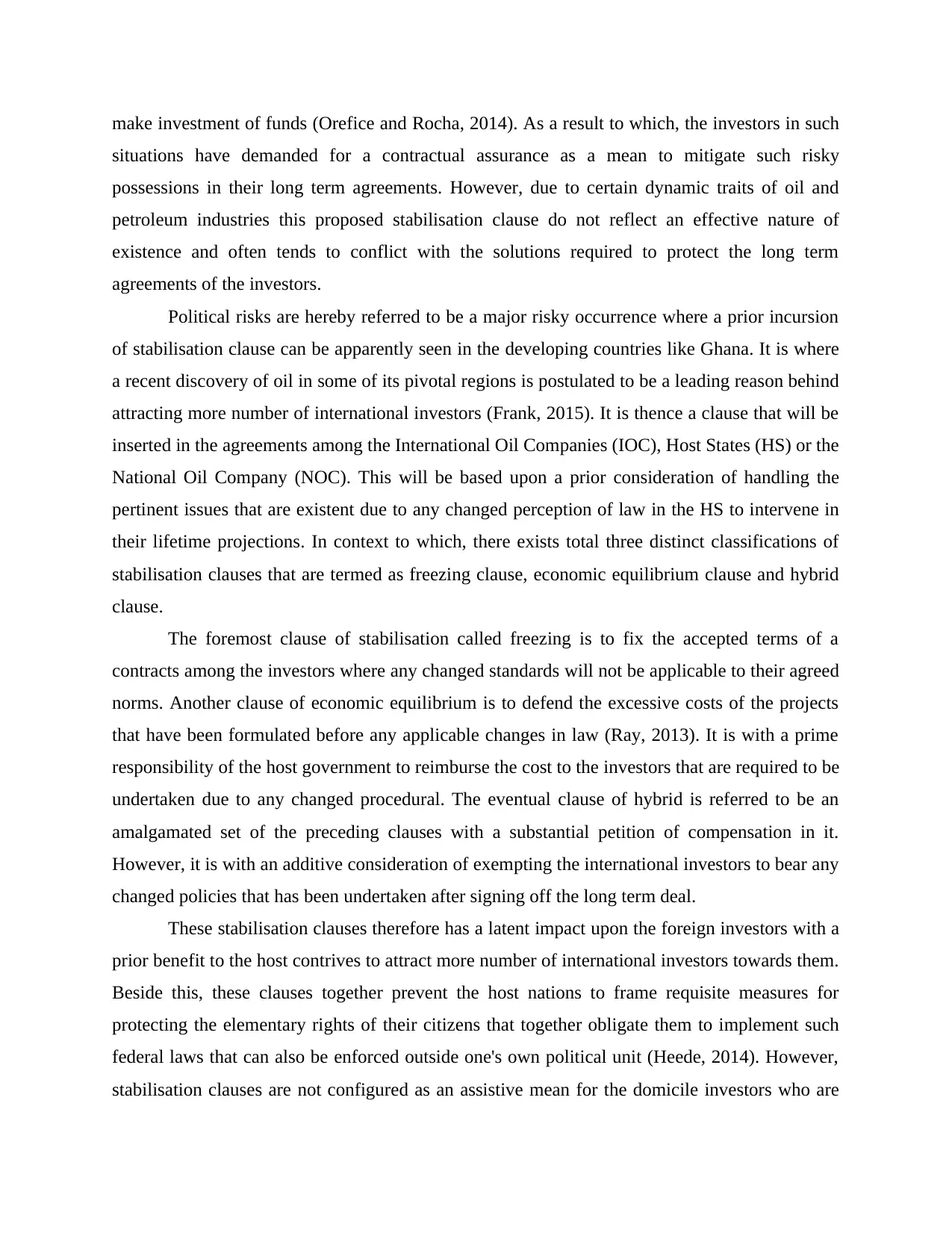
make investment of funds (Orefice and Rocha, 2014). As a result to which, the investors in such
situations have demanded for a contractual assurance as a mean to mitigate such risky
possessions in their long term agreements. However, due to certain dynamic traits of oil and
petroleum industries this proposed stabilisation clause do not reflect an effective nature of
existence and often tends to conflict with the solutions required to protect the long term
agreements of the investors.
Political risks are hereby referred to be a major risky occurrence where a prior incursion
of stabilisation clause can be apparently seen in the developing countries like Ghana. It is where
a recent discovery of oil in some of its pivotal regions is postulated to be a leading reason behind
attracting more number of international investors (Frank, 2015). It is thence a clause that will be
inserted in the agreements among the International Oil Companies (IOC), Host States (HS) or the
National Oil Company (NOC). This will be based upon a prior consideration of handling the
pertinent issues that are existent due to any changed perception of law in the HS to intervene in
their lifetime projections. In context to which, there exists total three distinct classifications of
stabilisation clauses that are termed as freezing clause, economic equilibrium clause and hybrid
clause.
The foremost clause of stabilisation called freezing is to fix the accepted terms of a
contracts among the investors where any changed standards will not be applicable to their agreed
norms. Another clause of economic equilibrium is to defend the excessive costs of the projects
that have been formulated before any applicable changes in law (Ray, 2013). It is with a prime
responsibility of the host government to reimburse the cost to the investors that are required to be
undertaken due to any changed procedural. The eventual clause of hybrid is referred to be an
amalgamated set of the preceding clauses with a substantial petition of compensation in it.
However, it is with an additive consideration of exempting the international investors to bear any
changed policies that has been undertaken after signing off the long term deal.
These stabilisation clauses therefore has a latent impact upon the foreign investors with a
prior benefit to the host contrives to attract more number of international investors towards them.
Beside this, these clauses together prevent the host nations to frame requisite measures for
protecting the elementary rights of their citizens that together obligate them to implement such
federal laws that can also be enforced outside one's own political unit (Heede, 2014). However,
stabilisation clauses are not configured as an assistive mean for the domicile investors who are
situations have demanded for a contractual assurance as a mean to mitigate such risky
possessions in their long term agreements. However, due to certain dynamic traits of oil and
petroleum industries this proposed stabilisation clause do not reflect an effective nature of
existence and often tends to conflict with the solutions required to protect the long term
agreements of the investors.
Political risks are hereby referred to be a major risky occurrence where a prior incursion
of stabilisation clause can be apparently seen in the developing countries like Ghana. It is where
a recent discovery of oil in some of its pivotal regions is postulated to be a leading reason behind
attracting more number of international investors (Frank, 2015). It is thence a clause that will be
inserted in the agreements among the International Oil Companies (IOC), Host States (HS) or the
National Oil Company (NOC). This will be based upon a prior consideration of handling the
pertinent issues that are existent due to any changed perception of law in the HS to intervene in
their lifetime projections. In context to which, there exists total three distinct classifications of
stabilisation clauses that are termed as freezing clause, economic equilibrium clause and hybrid
clause.
The foremost clause of stabilisation called freezing is to fix the accepted terms of a
contracts among the investors where any changed standards will not be applicable to their agreed
norms. Another clause of economic equilibrium is to defend the excessive costs of the projects
that have been formulated before any applicable changes in law (Ray, 2013). It is with a prime
responsibility of the host government to reimburse the cost to the investors that are required to be
undertaken due to any changed procedural. The eventual clause of hybrid is referred to be an
amalgamated set of the preceding clauses with a substantial petition of compensation in it.
However, it is with an additive consideration of exempting the international investors to bear any
changed policies that has been undertaken after signing off the long term deal.
These stabilisation clauses therefore has a latent impact upon the foreign investors with a
prior benefit to the host contrives to attract more number of international investors towards them.
Beside this, these clauses together prevent the host nations to frame requisite measures for
protecting the elementary rights of their citizens that together obligate them to implement such
federal laws that can also be enforced outside one's own political unit (Heede, 2014). However,
stabilisation clauses are not configured as an assistive mean for the domicile investors who are
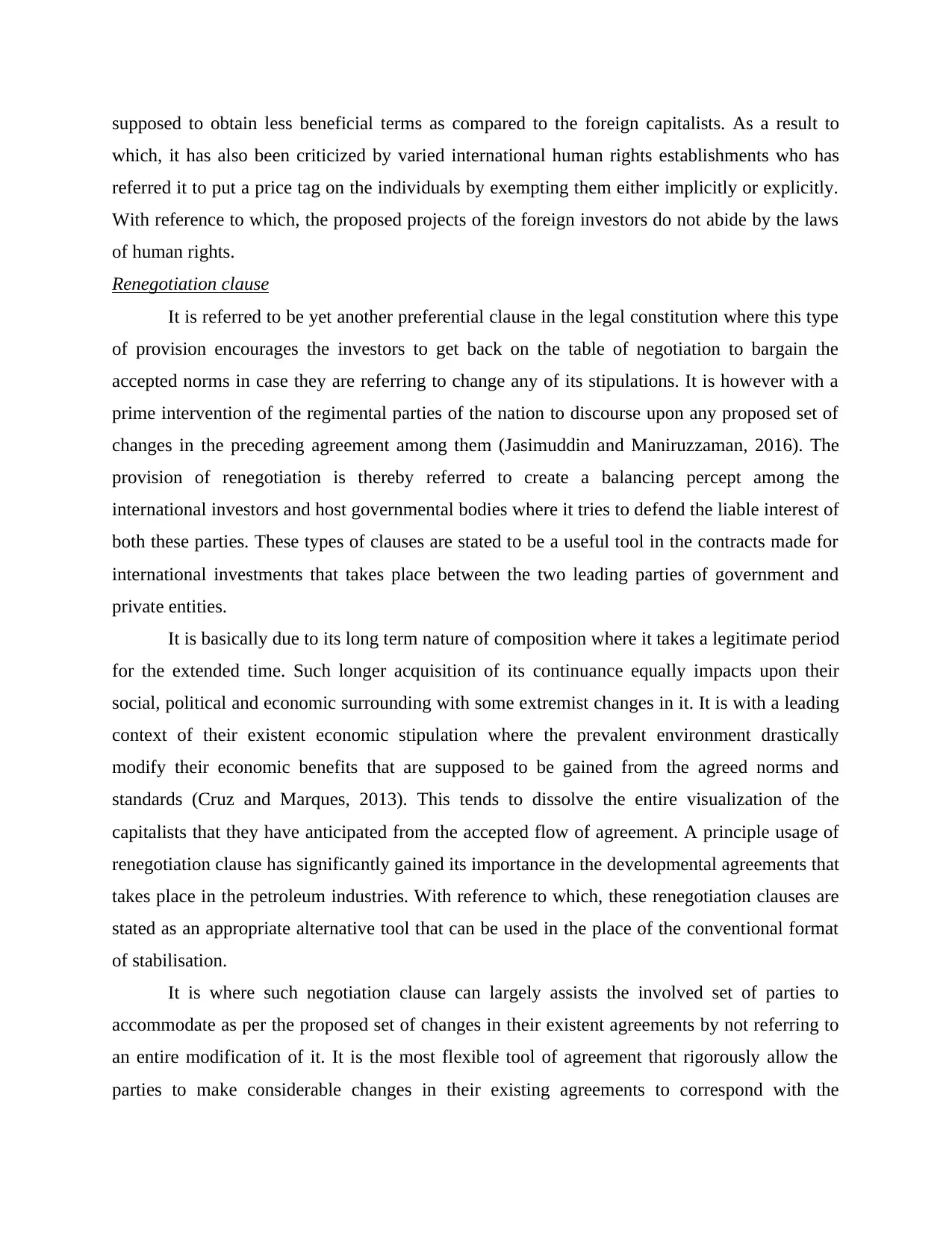
supposed to obtain less beneficial terms as compared to the foreign capitalists. As a result to
which, it has also been criticized by varied international human rights establishments who has
referred it to put a price tag on the individuals by exempting them either implicitly or explicitly.
With reference to which, the proposed projects of the foreign investors do not abide by the laws
of human rights.
Renegotiation clause
It is referred to be yet another preferential clause in the legal constitution where this type
of provision encourages the investors to get back on the table of negotiation to bargain the
accepted norms in case they are referring to change any of its stipulations. It is however with a
prime intervention of the regimental parties of the nation to discourse upon any proposed set of
changes in the preceding agreement among them (Jasimuddin and Maniruzzaman, 2016). The
provision of renegotiation is thereby referred to create a balancing percept among the
international investors and host governmental bodies where it tries to defend the liable interest of
both these parties. These types of clauses are stated to be a useful tool in the contracts made for
international investments that takes place between the two leading parties of government and
private entities.
It is basically due to its long term nature of composition where it takes a legitimate period
for the extended time. Such longer acquisition of its continuance equally impacts upon their
social, political and economic surrounding with some extremist changes in it. It is with a leading
context of their existent economic stipulation where the prevalent environment drastically
modify their economic benefits that are supposed to be gained from the agreed norms and
standards (Cruz and Marques, 2013). This tends to dissolve the entire visualization of the
capitalists that they have anticipated from the accepted flow of agreement. A principle usage of
renegotiation clause has significantly gained its importance in the developmental agreements that
takes place in the petroleum industries. With reference to which, these renegotiation clauses are
stated as an appropriate alternative tool that can be used in the place of the conventional format
of stabilisation.
It is where such negotiation clause can largely assists the involved set of parties to
accommodate as per the proposed set of changes in their existent agreements by not referring to
an entire modification of it. It is the most flexible tool of agreement that rigorously allow the
parties to make considerable changes in their existing agreements to correspond with the
which, it has also been criticized by varied international human rights establishments who has
referred it to put a price tag on the individuals by exempting them either implicitly or explicitly.
With reference to which, the proposed projects of the foreign investors do not abide by the laws
of human rights.
Renegotiation clause
It is referred to be yet another preferential clause in the legal constitution where this type
of provision encourages the investors to get back on the table of negotiation to bargain the
accepted norms in case they are referring to change any of its stipulations. It is however with a
prime intervention of the regimental parties of the nation to discourse upon any proposed set of
changes in the preceding agreement among them (Jasimuddin and Maniruzzaman, 2016). The
provision of renegotiation is thereby referred to create a balancing percept among the
international investors and host governmental bodies where it tries to defend the liable interest of
both these parties. These types of clauses are stated to be a useful tool in the contracts made for
international investments that takes place between the two leading parties of government and
private entities.
It is basically due to its long term nature of composition where it takes a legitimate period
for the extended time. Such longer acquisition of its continuance equally impacts upon their
social, political and economic surrounding with some extremist changes in it. It is with a leading
context of their existent economic stipulation where the prevalent environment drastically
modify their economic benefits that are supposed to be gained from the agreed norms and
standards (Cruz and Marques, 2013). This tends to dissolve the entire visualization of the
capitalists that they have anticipated from the accepted flow of agreement. A principle usage of
renegotiation clause has significantly gained its importance in the developmental agreements that
takes place in the petroleum industries. With reference to which, these renegotiation clauses are
stated as an appropriate alternative tool that can be used in the place of the conventional format
of stabilisation.
It is where such negotiation clause can largely assists the involved set of parties to
accommodate as per the proposed set of changes in their existent agreements by not referring to
an entire modification of it. It is the most flexible tool of agreement that rigorously allow the
parties to make considerable changes in their existing agreements to correspond with the
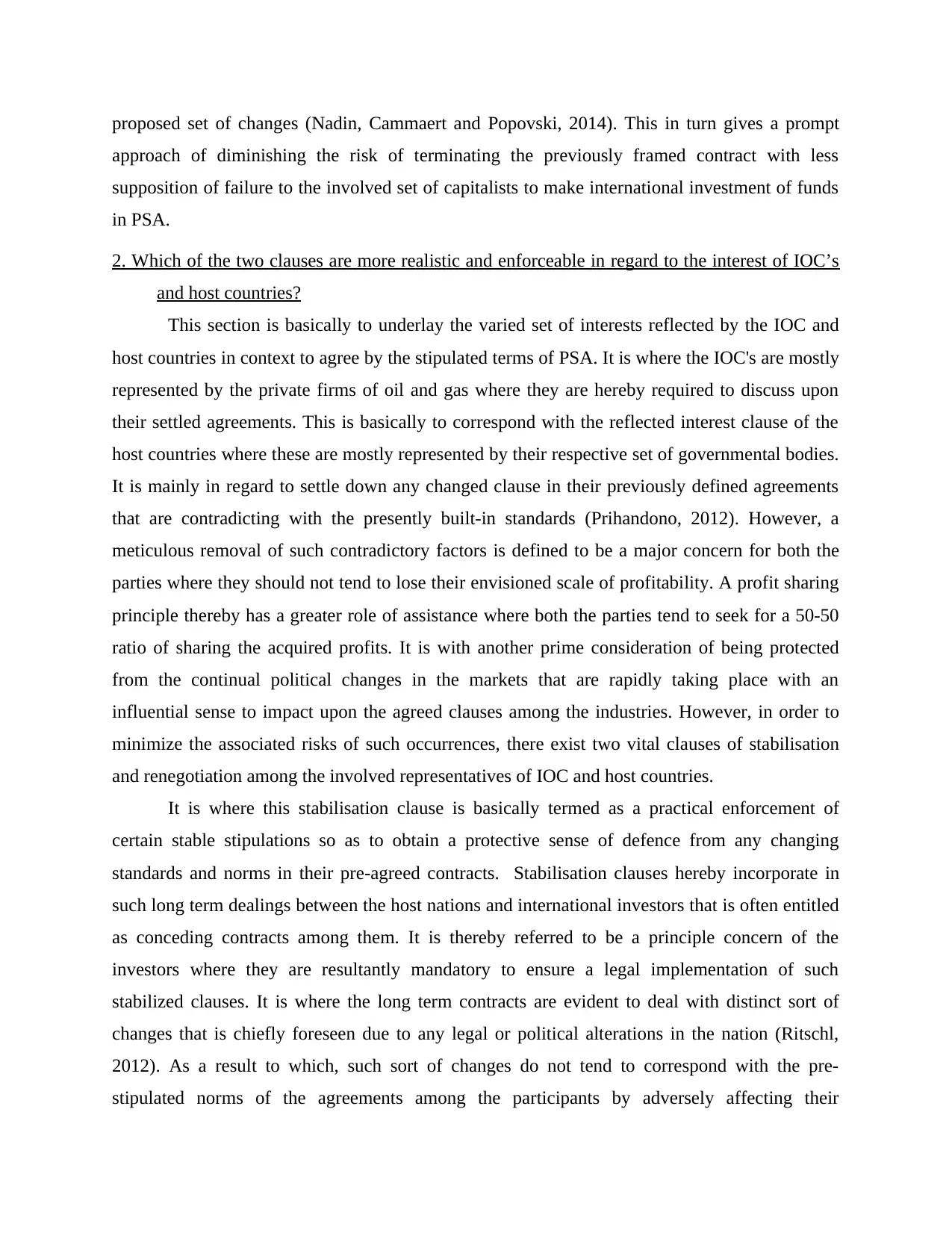
proposed set of changes (Nadin, Cammaert and Popovski, 2014). This in turn gives a prompt
approach of diminishing the risk of terminating the previously framed contract with less
supposition of failure to the involved set of capitalists to make international investment of funds
in PSA.
2. Which of the two clauses are more realistic and enforceable in regard to the interest of IOC’s
and host countries?
This section is basically to underlay the varied set of interests reflected by the IOC and
host countries in context to agree by the stipulated terms of PSA. It is where the IOC's are mostly
represented by the private firms of oil and gas where they are hereby required to discuss upon
their settled agreements. This is basically to correspond with the reflected interest clause of the
host countries where these are mostly represented by their respective set of governmental bodies.
It is mainly in regard to settle down any changed clause in their previously defined agreements
that are contradicting with the presently built-in standards (Prihandono, 2012). However, a
meticulous removal of such contradictory factors is defined to be a major concern for both the
parties where they should not tend to lose their envisioned scale of profitability. A profit sharing
principle thereby has a greater role of assistance where both the parties tend to seek for a 50-50
ratio of sharing the acquired profits. It is with another prime consideration of being protected
from the continual political changes in the markets that are rapidly taking place with an
influential sense to impact upon the agreed clauses among the industries. However, in order to
minimize the associated risks of such occurrences, there exist two vital clauses of stabilisation
and renegotiation among the involved representatives of IOC and host countries.
It is where this stabilisation clause is basically termed as a practical enforcement of
certain stable stipulations so as to obtain a protective sense of defence from any changing
standards and norms in their pre-agreed contracts. Stabilisation clauses hereby incorporate in
such long term dealings between the host nations and international investors that is often entitled
as conceding contracts among them. It is thereby referred to be a principle concern of the
investors where they are resultantly mandatory to ensure a legal implementation of such
stabilized clauses. It is where the long term contracts are evident to deal with distinct sort of
changes that is chiefly foreseen due to any legal or political alterations in the nation (Ritschl,
2012). As a result to which, such sort of changes do not tend to correspond with the pre-
stipulated norms of the agreements among the participants by adversely affecting their
approach of diminishing the risk of terminating the previously framed contract with less
supposition of failure to the involved set of capitalists to make international investment of funds
in PSA.
2. Which of the two clauses are more realistic and enforceable in regard to the interest of IOC’s
and host countries?
This section is basically to underlay the varied set of interests reflected by the IOC and
host countries in context to agree by the stipulated terms of PSA. It is where the IOC's are mostly
represented by the private firms of oil and gas where they are hereby required to discuss upon
their settled agreements. This is basically to correspond with the reflected interest clause of the
host countries where these are mostly represented by their respective set of governmental bodies.
It is mainly in regard to settle down any changed clause in their previously defined agreements
that are contradicting with the presently built-in standards (Prihandono, 2012). However, a
meticulous removal of such contradictory factors is defined to be a major concern for both the
parties where they should not tend to lose their envisioned scale of profitability. A profit sharing
principle thereby has a greater role of assistance where both the parties tend to seek for a 50-50
ratio of sharing the acquired profits. It is with another prime consideration of being protected
from the continual political changes in the markets that are rapidly taking place with an
influential sense to impact upon the agreed clauses among the industries. However, in order to
minimize the associated risks of such occurrences, there exist two vital clauses of stabilisation
and renegotiation among the involved representatives of IOC and host countries.
It is where this stabilisation clause is basically termed as a practical enforcement of
certain stable stipulations so as to obtain a protective sense of defence from any changing
standards and norms in their pre-agreed contracts. Stabilisation clauses hereby incorporate in
such long term dealings between the host nations and international investors that is often entitled
as conceding contracts among them. It is thereby referred to be a principle concern of the
investors where they are resultantly mandatory to ensure a legal implementation of such
stabilized clauses. It is where the long term contracts are evident to deal with distinct sort of
changes that is chiefly foreseen due to any legal or political alterations in the nation (Ritschl,
2012). As a result to which, such sort of changes do not tend to correspond with the pre-
stipulated norms of the agreements among the participants by adversely affecting their
Secure Best Marks with AI Grader
Need help grading? Try our AI Grader for instant feedback on your assignments.
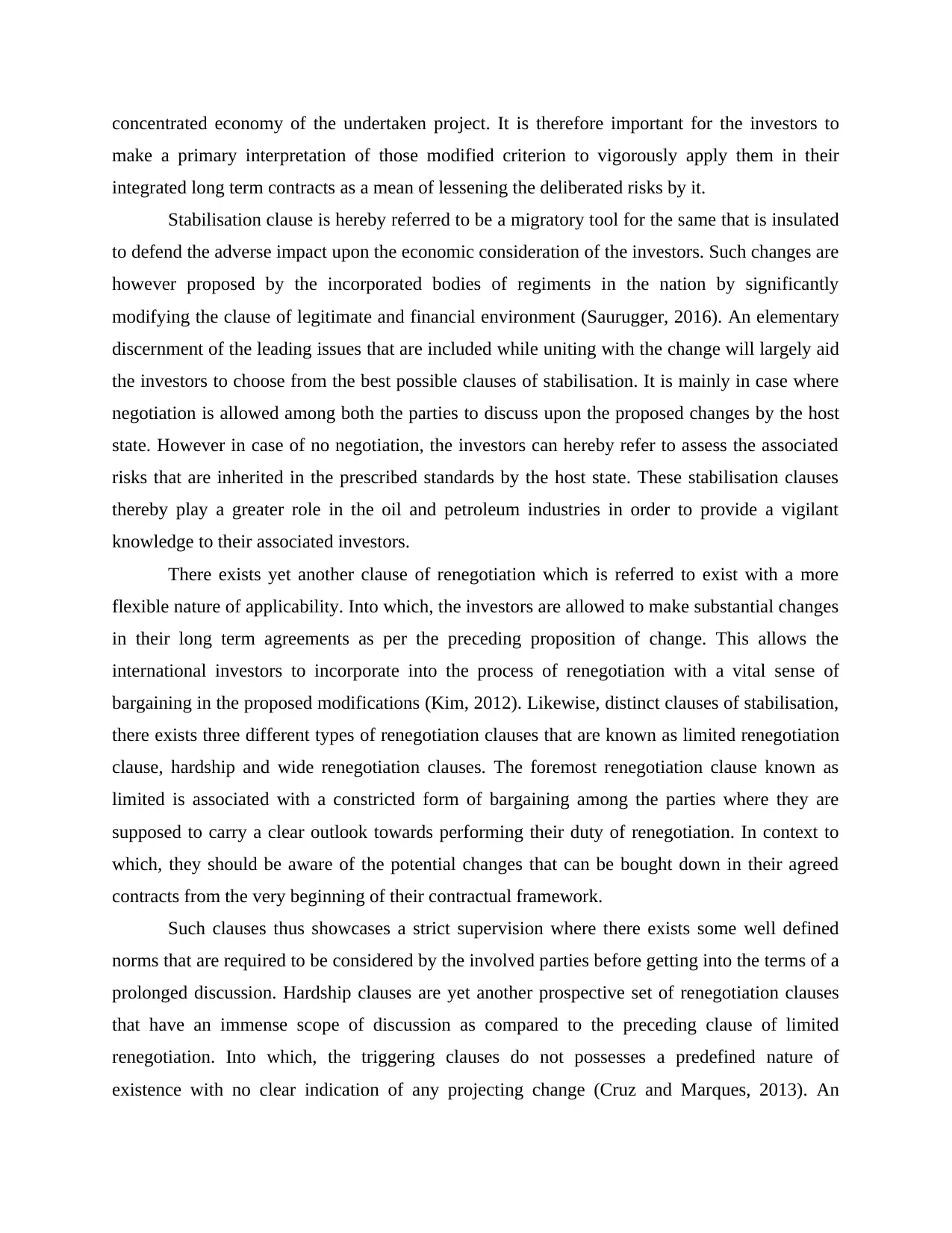
concentrated economy of the undertaken project. It is therefore important for the investors to
make a primary interpretation of those modified criterion to vigorously apply them in their
integrated long term contracts as a mean of lessening the deliberated risks by it.
Stabilisation clause is hereby referred to be a migratory tool for the same that is insulated
to defend the adverse impact upon the economic consideration of the investors. Such changes are
however proposed by the incorporated bodies of regiments in the nation by significantly
modifying the clause of legitimate and financial environment (Saurugger, 2016). An elementary
discernment of the leading issues that are included while uniting with the change will largely aid
the investors to choose from the best possible clauses of stabilisation. It is mainly in case where
negotiation is allowed among both the parties to discuss upon the proposed changes by the host
state. However in case of no negotiation, the investors can hereby refer to assess the associated
risks that are inherited in the prescribed standards by the host state. These stabilisation clauses
thereby play a greater role in the oil and petroleum industries in order to provide a vigilant
knowledge to their associated investors.
There exists yet another clause of renegotiation which is referred to exist with a more
flexible nature of applicability. Into which, the investors are allowed to make substantial changes
in their long term agreements as per the preceding proposition of change. This allows the
international investors to incorporate into the process of renegotiation with a vital sense of
bargaining in the proposed modifications (Kim, 2012). Likewise, distinct clauses of stabilisation,
there exists three different types of renegotiation clauses that are known as limited renegotiation
clause, hardship and wide renegotiation clauses. The foremost renegotiation clause known as
limited is associated with a constricted form of bargaining among the parties where they are
supposed to carry a clear outlook towards performing their duty of renegotiation. In context to
which, they should be aware of the potential changes that can be bought down in their agreed
contracts from the very beginning of their contractual framework.
Such clauses thus showcases a strict supervision where there exists some well defined
norms that are required to be considered by the involved parties before getting into the terms of a
prolonged discussion. Hardship clauses are yet another prospective set of renegotiation clauses
that have an immense scope of discussion as compared to the preceding clause of limited
renegotiation. Into which, the triggering clauses do not possesses a predefined nature of
existence with no clear indication of any projecting change (Cruz and Marques, 2013). An
make a primary interpretation of those modified criterion to vigorously apply them in their
integrated long term contracts as a mean of lessening the deliberated risks by it.
Stabilisation clause is hereby referred to be a migratory tool for the same that is insulated
to defend the adverse impact upon the economic consideration of the investors. Such changes are
however proposed by the incorporated bodies of regiments in the nation by significantly
modifying the clause of legitimate and financial environment (Saurugger, 2016). An elementary
discernment of the leading issues that are included while uniting with the change will largely aid
the investors to choose from the best possible clauses of stabilisation. It is mainly in case where
negotiation is allowed among both the parties to discuss upon the proposed changes by the host
state. However in case of no negotiation, the investors can hereby refer to assess the associated
risks that are inherited in the prescribed standards by the host state. These stabilisation clauses
thereby play a greater role in the oil and petroleum industries in order to provide a vigilant
knowledge to their associated investors.
There exists yet another clause of renegotiation which is referred to exist with a more
flexible nature of applicability. Into which, the investors are allowed to make substantial changes
in their long term agreements as per the preceding proposition of change. This allows the
international investors to incorporate into the process of renegotiation with a vital sense of
bargaining in the proposed modifications (Kim, 2012). Likewise, distinct clauses of stabilisation,
there exists three different types of renegotiation clauses that are known as limited renegotiation
clause, hardship and wide renegotiation clauses. The foremost renegotiation clause known as
limited is associated with a constricted form of bargaining among the parties where they are
supposed to carry a clear outlook towards performing their duty of renegotiation. In context to
which, they should be aware of the potential changes that can be bought down in their agreed
contracts from the very beginning of their contractual framework.
Such clauses thus showcases a strict supervision where there exists some well defined
norms that are required to be considered by the involved parties before getting into the terms of a
prolonged discussion. Hardship clauses are yet another prospective set of renegotiation clauses
that have an immense scope of discussion as compared to the preceding clause of limited
renegotiation. Into which, the triggering clauses do not possesses a predefined nature of
existence with no clear indication of any projecting change (Cruz and Marques, 2013). An
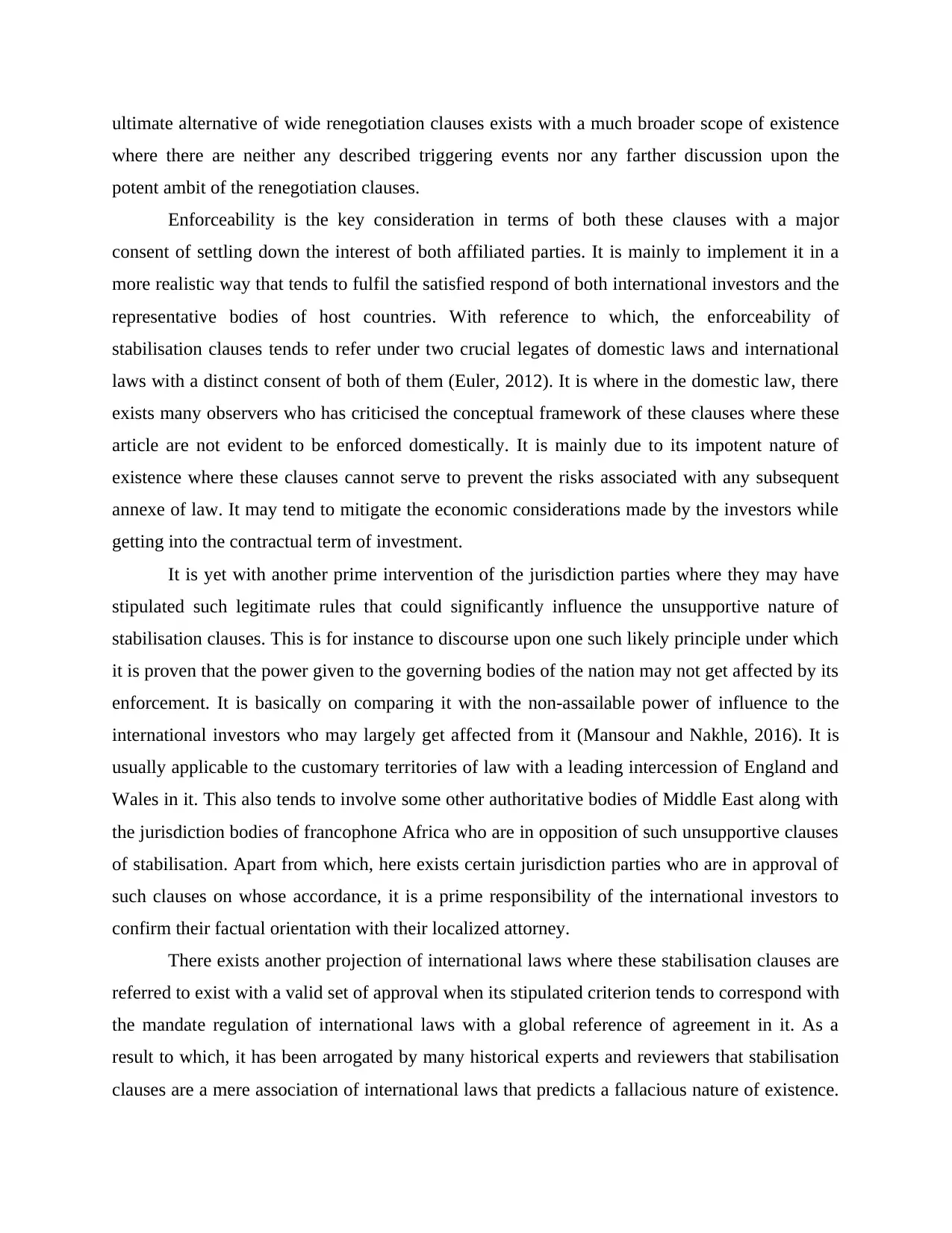
ultimate alternative of wide renegotiation clauses exists with a much broader scope of existence
where there are neither any described triggering events nor any farther discussion upon the
potent ambit of the renegotiation clauses.
Enforceability is the key consideration in terms of both these clauses with a major
consent of settling down the interest of both affiliated parties. It is mainly to implement it in a
more realistic way that tends to fulfil the satisfied respond of both international investors and the
representative bodies of host countries. With reference to which, the enforceability of
stabilisation clauses tends to refer under two crucial legates of domestic laws and international
laws with a distinct consent of both of them (Euler, 2012). It is where in the domestic law, there
exists many observers who has criticised the conceptual framework of these clauses where these
article are not evident to be enforced domestically. It is mainly due to its impotent nature of
existence where these clauses cannot serve to prevent the risks associated with any subsequent
annexe of law. It may tend to mitigate the economic considerations made by the investors while
getting into the contractual term of investment.
It is yet with another prime intervention of the jurisdiction parties where they may have
stipulated such legitimate rules that could significantly influence the unsupportive nature of
stabilisation clauses. This is for instance to discourse upon one such likely principle under which
it is proven that the power given to the governing bodies of the nation may not get affected by its
enforcement. It is basically on comparing it with the non-assailable power of influence to the
international investors who may largely get affected from it (Mansour and Nakhle, 2016). It is
usually applicable to the customary territories of law with a leading intercession of England and
Wales in it. This also tends to involve some other authoritative bodies of Middle East along with
the jurisdiction bodies of francophone Africa who are in opposition of such unsupportive clauses
of stabilisation. Apart from which, here exists certain jurisdiction parties who are in approval of
such clauses on whose accordance, it is a prime responsibility of the international investors to
confirm their factual orientation with their localized attorney.
There exists another projection of international laws where these stabilisation clauses are
referred to exist with a valid set of approval when its stipulated criterion tends to correspond with
the mandate regulation of international laws with a global reference of agreement in it. As a
result to which, it has been arrogated by many historical experts and reviewers that stabilisation
clauses are a mere association of international laws that predicts a fallacious nature of existence.
where there are neither any described triggering events nor any farther discussion upon the
potent ambit of the renegotiation clauses.
Enforceability is the key consideration in terms of both these clauses with a major
consent of settling down the interest of both affiliated parties. It is mainly to implement it in a
more realistic way that tends to fulfil the satisfied respond of both international investors and the
representative bodies of host countries. With reference to which, the enforceability of
stabilisation clauses tends to refer under two crucial legates of domestic laws and international
laws with a distinct consent of both of them (Euler, 2012). It is where in the domestic law, there
exists many observers who has criticised the conceptual framework of these clauses where these
article are not evident to be enforced domestically. It is mainly due to its impotent nature of
existence where these clauses cannot serve to prevent the risks associated with any subsequent
annexe of law. It may tend to mitigate the economic considerations made by the investors while
getting into the contractual term of investment.
It is yet with another prime intervention of the jurisdiction parties where they may have
stipulated such legitimate rules that could significantly influence the unsupportive nature of
stabilisation clauses. This is for instance to discourse upon one such likely principle under which
it is proven that the power given to the governing bodies of the nation may not get affected by its
enforcement. It is basically on comparing it with the non-assailable power of influence to the
international investors who may largely get affected from it (Mansour and Nakhle, 2016). It is
usually applicable to the customary territories of law with a leading intercession of England and
Wales in it. This also tends to involve some other authoritative bodies of Middle East along with
the jurisdiction bodies of francophone Africa who are in opposition of such unsupportive clauses
of stabilisation. Apart from which, here exists certain jurisdiction parties who are in approval of
such clauses on whose accordance, it is a prime responsibility of the international investors to
confirm their factual orientation with their localized attorney.
There exists another projection of international laws where these stabilisation clauses are
referred to exist with a valid set of approval when its stipulated criterion tends to correspond with
the mandate regulation of international laws with a global reference of agreement in it. As a
result to which, it has been arrogated by many historical experts and reviewers that stabilisation
clauses are a mere association of international laws that predicts a fallacious nature of existence.
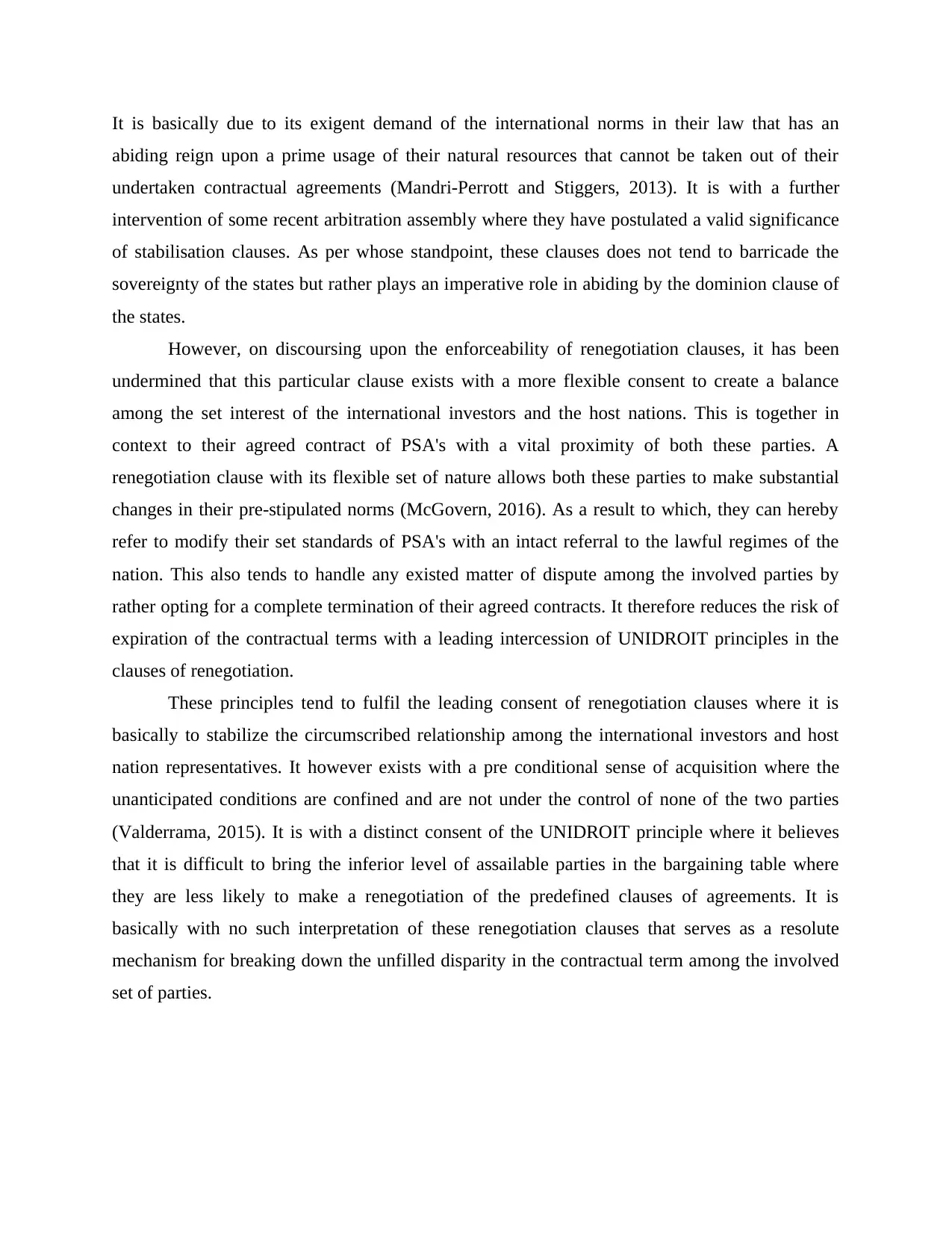
It is basically due to its exigent demand of the international norms in their law that has an
abiding reign upon a prime usage of their natural resources that cannot be taken out of their
undertaken contractual agreements (Mandri-Perrott and Stiggers, 2013). It is with a further
intervention of some recent arbitration assembly where they have postulated a valid significance
of stabilisation clauses. As per whose standpoint, these clauses does not tend to barricade the
sovereignty of the states but rather plays an imperative role in abiding by the dominion clause of
the states.
However, on discoursing upon the enforceability of renegotiation clauses, it has been
undermined that this particular clause exists with a more flexible consent to create a balance
among the set interest of the international investors and the host nations. This is together in
context to their agreed contract of PSA's with a vital proximity of both these parties. A
renegotiation clause with its flexible set of nature allows both these parties to make substantial
changes in their pre-stipulated norms (McGovern, 2016). As a result to which, they can hereby
refer to modify their set standards of PSA's with an intact referral to the lawful regimes of the
nation. This also tends to handle any existed matter of dispute among the involved parties by
rather opting for a complete termination of their agreed contracts. It therefore reduces the risk of
expiration of the contractual terms with a leading intercession of UNIDROIT principles in the
clauses of renegotiation.
These principles tend to fulfil the leading consent of renegotiation clauses where it is
basically to stabilize the circumscribed relationship among the international investors and host
nation representatives. It however exists with a pre conditional sense of acquisition where the
unanticipated conditions are confined and are not under the control of none of the two parties
(Valderrama, 2015). It is with a distinct consent of the UNIDROIT principle where it believes
that it is difficult to bring the inferior level of assailable parties in the bargaining table where
they are less likely to make a renegotiation of the predefined clauses of agreements. It is
basically with no such interpretation of these renegotiation clauses that serves as a resolute
mechanism for breaking down the unfilled disparity in the contractual term among the involved
set of parties.
abiding reign upon a prime usage of their natural resources that cannot be taken out of their
undertaken contractual agreements (Mandri-Perrott and Stiggers, 2013). It is with a further
intervention of some recent arbitration assembly where they have postulated a valid significance
of stabilisation clauses. As per whose standpoint, these clauses does not tend to barricade the
sovereignty of the states but rather plays an imperative role in abiding by the dominion clause of
the states.
However, on discoursing upon the enforceability of renegotiation clauses, it has been
undermined that this particular clause exists with a more flexible consent to create a balance
among the set interest of the international investors and the host nations. This is together in
context to their agreed contract of PSA's with a vital proximity of both these parties. A
renegotiation clause with its flexible set of nature allows both these parties to make substantial
changes in their pre-stipulated norms (McGovern, 2016). As a result to which, they can hereby
refer to modify their set standards of PSA's with an intact referral to the lawful regimes of the
nation. This also tends to handle any existed matter of dispute among the involved parties by
rather opting for a complete termination of their agreed contracts. It therefore reduces the risk of
expiration of the contractual terms with a leading intercession of UNIDROIT principles in the
clauses of renegotiation.
These principles tend to fulfil the leading consent of renegotiation clauses where it is
basically to stabilize the circumscribed relationship among the international investors and host
nation representatives. It however exists with a pre conditional sense of acquisition where the
unanticipated conditions are confined and are not under the control of none of the two parties
(Valderrama, 2015). It is with a distinct consent of the UNIDROIT principle where it believes
that it is difficult to bring the inferior level of assailable parties in the bargaining table where
they are less likely to make a renegotiation of the predefined clauses of agreements. It is
basically with no such interpretation of these renegotiation clauses that serves as a resolute
mechanism for breaking down the unfilled disparity in the contractual term among the involved
set of parties.
Paraphrase This Document
Need a fresh take? Get an instant paraphrase of this document with our AI Paraphraser
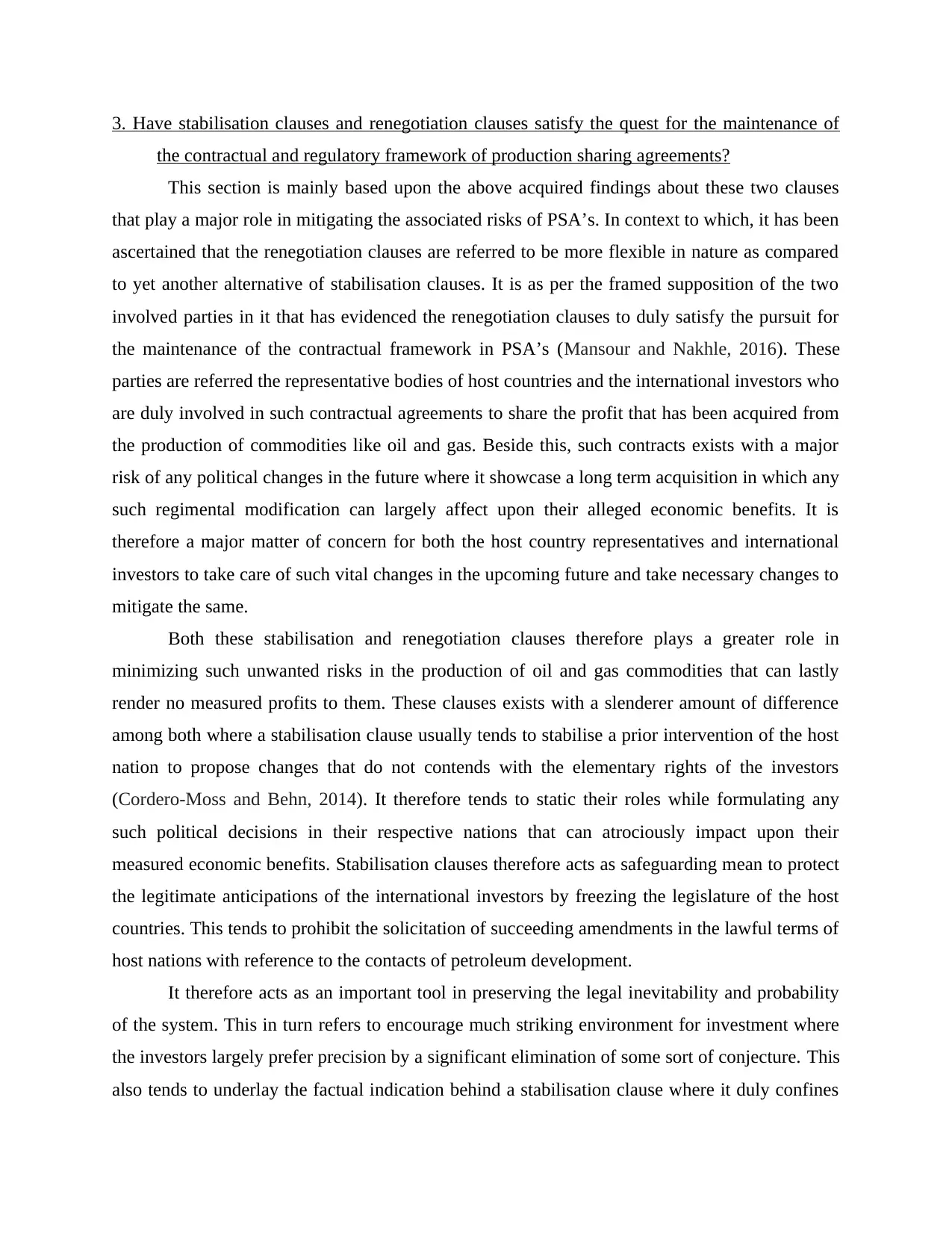
3. Have stabilisation clauses and renegotiation clauses satisfy the quest for the maintenance of
the contractual and regulatory framework of production sharing agreements?
This section is mainly based upon the above acquired findings about these two clauses
that play a major role in mitigating the associated risks of PSA’s. In context to which, it has been
ascertained that the renegotiation clauses are referred to be more flexible in nature as compared
to yet another alternative of stabilisation clauses. It is as per the framed supposition of the two
involved parties in it that has evidenced the renegotiation clauses to duly satisfy the pursuit for
the maintenance of the contractual framework in PSA’s (Mansour and Nakhle, 2016). These
parties are referred the representative bodies of host countries and the international investors who
are duly involved in such contractual agreements to share the profit that has been acquired from
the production of commodities like oil and gas. Beside this, such contracts exists with a major
risk of any political changes in the future where it showcase a long term acquisition in which any
such regimental modification can largely affect upon their alleged economic benefits. It is
therefore a major matter of concern for both the host country representatives and international
investors to take care of such vital changes in the upcoming future and take necessary changes to
mitigate the same.
Both these stabilisation and renegotiation clauses therefore plays a greater role in
minimizing such unwanted risks in the production of oil and gas commodities that can lastly
render no measured profits to them. These clauses exists with a slenderer amount of difference
among both where a stabilisation clause usually tends to stabilise a prior intervention of the host
nation to propose changes that do not contends with the elementary rights of the investors
(Cordero-Moss and Behn, 2014). It therefore tends to static their roles while formulating any
such political decisions in their respective nations that can atrociously impact upon their
measured economic benefits. Stabilisation clauses therefore acts as safeguarding mean to protect
the legitimate anticipations of the international investors by freezing the legislature of the host
countries. This tends to prohibit the solicitation of succeeding amendments in the lawful terms of
host nations with reference to the contacts of petroleum development.
It therefore acts as an important tool in preserving the legal inevitability and probability
of the system. This in turn refers to encourage much striking environment for investment where
the investors largely prefer precision by a significant elimination of some sort of conjecture. This
also tends to underlay the factual indication behind a stabilisation clause where it duly confines
the contractual and regulatory framework of production sharing agreements?
This section is mainly based upon the above acquired findings about these two clauses
that play a major role in mitigating the associated risks of PSA’s. In context to which, it has been
ascertained that the renegotiation clauses are referred to be more flexible in nature as compared
to yet another alternative of stabilisation clauses. It is as per the framed supposition of the two
involved parties in it that has evidenced the renegotiation clauses to duly satisfy the pursuit for
the maintenance of the contractual framework in PSA’s (Mansour and Nakhle, 2016). These
parties are referred the representative bodies of host countries and the international investors who
are duly involved in such contractual agreements to share the profit that has been acquired from
the production of commodities like oil and gas. Beside this, such contracts exists with a major
risk of any political changes in the future where it showcase a long term acquisition in which any
such regimental modification can largely affect upon their alleged economic benefits. It is
therefore a major matter of concern for both the host country representatives and international
investors to take care of such vital changes in the upcoming future and take necessary changes to
mitigate the same.
Both these stabilisation and renegotiation clauses therefore plays a greater role in
minimizing such unwanted risks in the production of oil and gas commodities that can lastly
render no measured profits to them. These clauses exists with a slenderer amount of difference
among both where a stabilisation clause usually tends to stabilise a prior intervention of the host
nation to propose changes that do not contends with the elementary rights of the investors
(Cordero-Moss and Behn, 2014). It therefore tends to static their roles while formulating any
such political decisions in their respective nations that can atrociously impact upon their
measured economic benefits. Stabilisation clauses therefore acts as safeguarding mean to protect
the legitimate anticipations of the international investors by freezing the legislature of the host
countries. This tends to prohibit the solicitation of succeeding amendments in the lawful terms of
host nations with reference to the contacts of petroleum development.
It therefore acts as an important tool in preserving the legal inevitability and probability
of the system. This in turn refers to encourage much striking environment for investment where
the investors largely prefer precision by a significant elimination of some sort of conjecture. This
also tends to underlay the factual indication behind a stabilisation clause where it duly confines
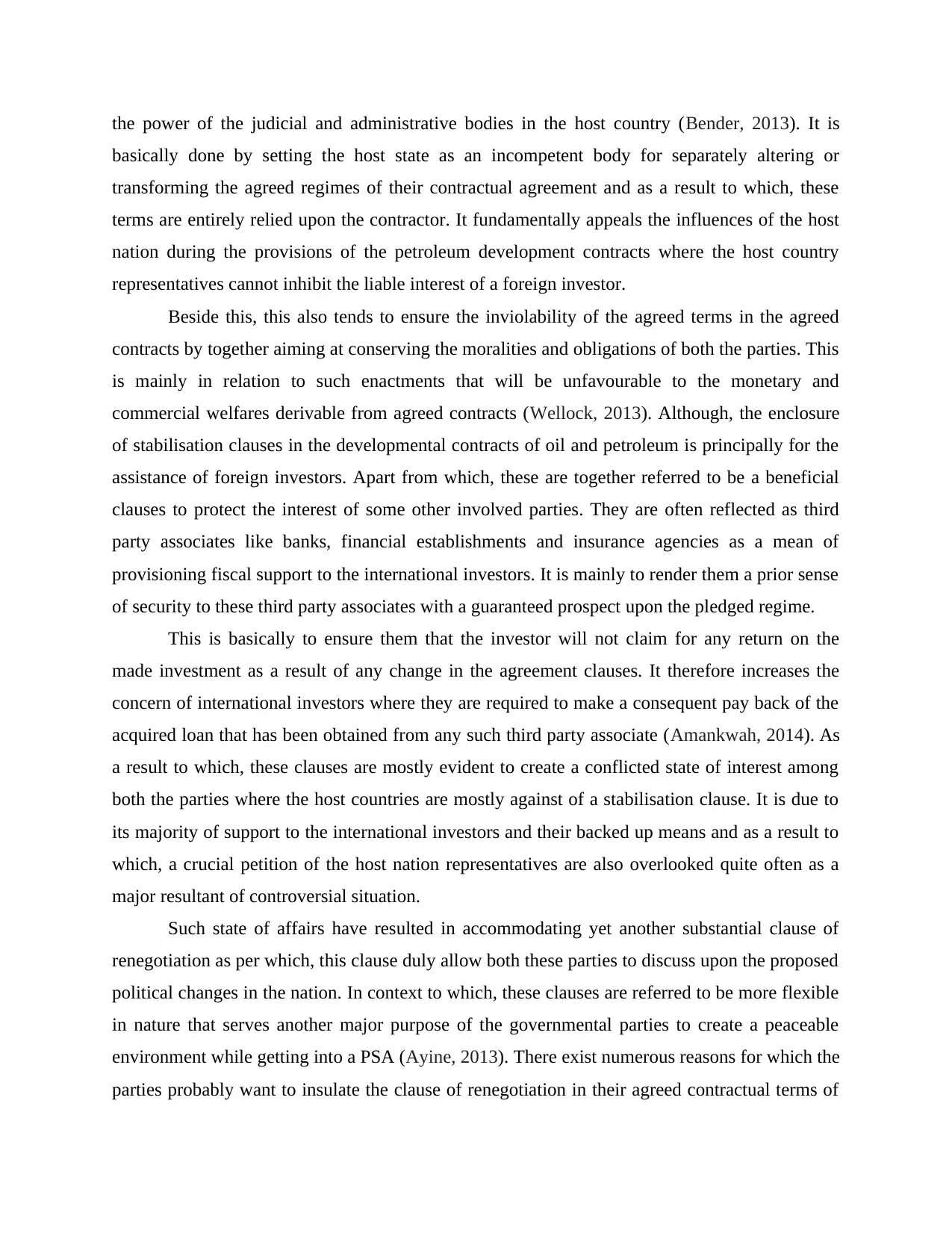
the power of the judicial and administrative bodies in the host country (Bender, 2013). It is
basically done by setting the host state as an incompetent body for separately altering or
transforming the agreed regimes of their contractual agreement and as a result to which, these
terms are entirely relied upon the contractor. It fundamentally appeals the influences of the host
nation during the provisions of the petroleum development contracts where the host country
representatives cannot inhibit the liable interest of a foreign investor.
Beside this, this also tends to ensure the inviolability of the agreed terms in the agreed
contracts by together aiming at conserving the moralities and obligations of both the parties. This
is mainly in relation to such enactments that will be unfavourable to the monetary and
commercial welfares derivable from agreed contracts (Wellock, 2013). Although, the enclosure
of stabilisation clauses in the developmental contracts of oil and petroleum is principally for the
assistance of foreign investors. Apart from which, these are together referred to be a beneficial
clauses to protect the interest of some other involved parties. They are often reflected as third
party associates like banks, financial establishments and insurance agencies as a mean of
provisioning fiscal support to the international investors. It is mainly to render them a prior sense
of security to these third party associates with a guaranteed prospect upon the pledged regime.
This is basically to ensure them that the investor will not claim for any return on the
made investment as a result of any change in the agreement clauses. It therefore increases the
concern of international investors where they are required to make a consequent pay back of the
acquired loan that has been obtained from any such third party associate (Amankwah, 2014). As
a result to which, these clauses are mostly evident to create a conflicted state of interest among
both the parties where the host countries are mostly against of a stabilisation clause. It is due to
its majority of support to the international investors and their backed up means and as a result to
which, a crucial petition of the host nation representatives are also overlooked quite often as a
major resultant of controversial situation.
Such state of affairs have resulted in accommodating yet another substantial clause of
renegotiation as per which, this clause duly allow both these parties to discuss upon the proposed
political changes in the nation. In context to which, these clauses are referred to be more flexible
in nature that serves another major purpose of the governmental parties to create a peaceable
environment while getting into a PSA (Ayine, 2013). There exist numerous reasons for which the
parties probably want to insulate the clause of renegotiation in their agreed contractual terms of
basically done by setting the host state as an incompetent body for separately altering or
transforming the agreed regimes of their contractual agreement and as a result to which, these
terms are entirely relied upon the contractor. It fundamentally appeals the influences of the host
nation during the provisions of the petroleum development contracts where the host country
representatives cannot inhibit the liable interest of a foreign investor.
Beside this, this also tends to ensure the inviolability of the agreed terms in the agreed
contracts by together aiming at conserving the moralities and obligations of both the parties. This
is mainly in relation to such enactments that will be unfavourable to the monetary and
commercial welfares derivable from agreed contracts (Wellock, 2013). Although, the enclosure
of stabilisation clauses in the developmental contracts of oil and petroleum is principally for the
assistance of foreign investors. Apart from which, these are together referred to be a beneficial
clauses to protect the interest of some other involved parties. They are often reflected as third
party associates like banks, financial establishments and insurance agencies as a mean of
provisioning fiscal support to the international investors. It is mainly to render them a prior sense
of security to these third party associates with a guaranteed prospect upon the pledged regime.
This is basically to ensure them that the investor will not claim for any return on the
made investment as a result of any change in the agreement clauses. It therefore increases the
concern of international investors where they are required to make a consequent pay back of the
acquired loan that has been obtained from any such third party associate (Amankwah, 2014). As
a result to which, these clauses are mostly evident to create a conflicted state of interest among
both the parties where the host countries are mostly against of a stabilisation clause. It is due to
its majority of support to the international investors and their backed up means and as a result to
which, a crucial petition of the host nation representatives are also overlooked quite often as a
major resultant of controversial situation.
Such state of affairs have resulted in accommodating yet another substantial clause of
renegotiation as per which, this clause duly allow both these parties to discuss upon the proposed
political changes in the nation. In context to which, these clauses are referred to be more flexible
in nature that serves another major purpose of the governmental parties to create a peaceable
environment while getting into a PSA (Ayine, 2013). There exist numerous reasons for which the
parties probably want to insulate the clause of renegotiation in their agreed contractual terms of
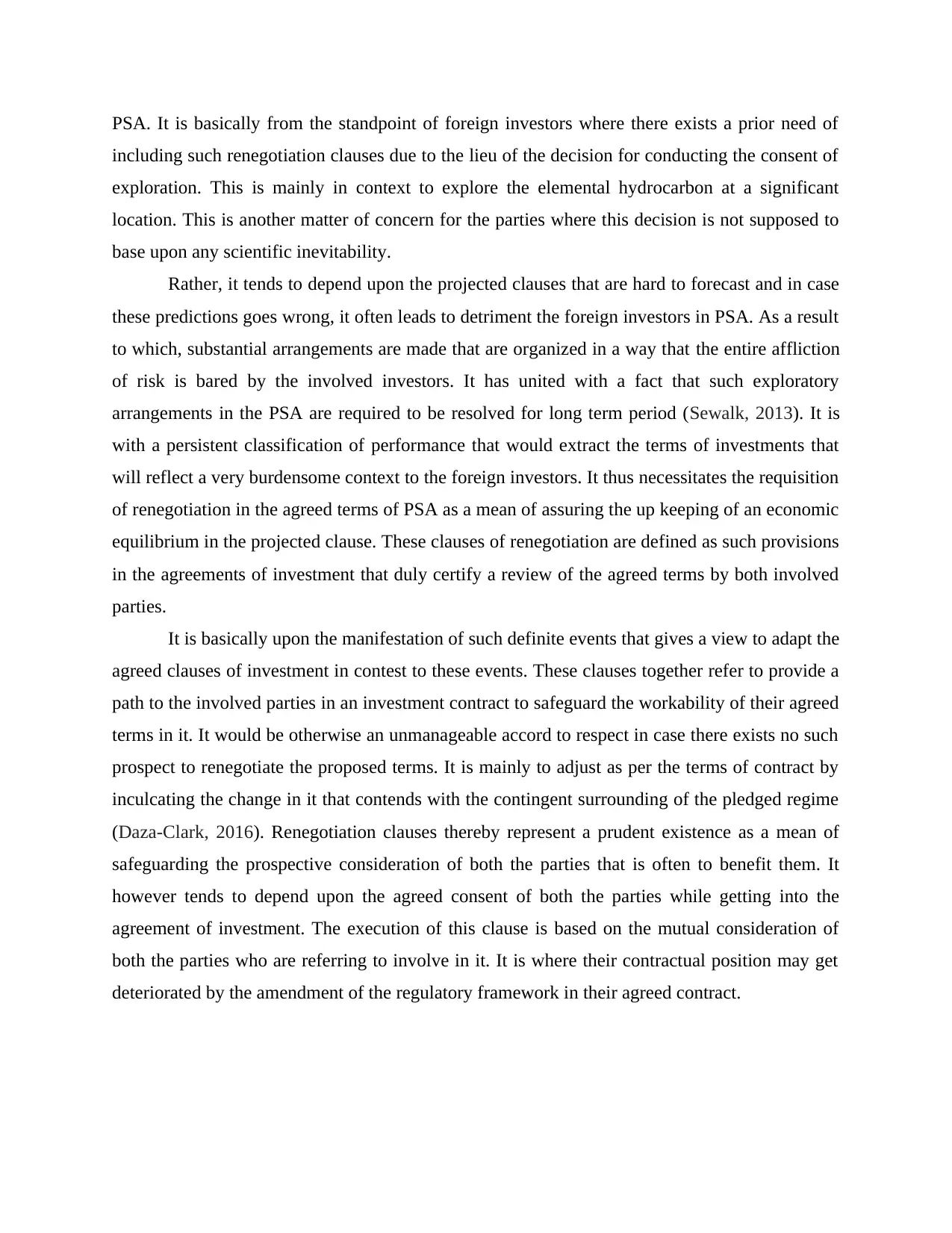
PSA. It is basically from the standpoint of foreign investors where there exists a prior need of
including such renegotiation clauses due to the lieu of the decision for conducting the consent of
exploration. This is mainly in context to explore the elemental hydrocarbon at a significant
location. This is another matter of concern for the parties where this decision is not supposed to
base upon any scientific inevitability.
Rather, it tends to depend upon the projected clauses that are hard to forecast and in case
these predictions goes wrong, it often leads to detriment the foreign investors in PSA. As a result
to which, substantial arrangements are made that are organized in a way that the entire affliction
of risk is bared by the involved investors. It has united with a fact that such exploratory
arrangements in the PSA are required to be resolved for long term period (Sewalk, 2013). It is
with a persistent classification of performance that would extract the terms of investments that
will reflect a very burdensome context to the foreign investors. It thus necessitates the requisition
of renegotiation in the agreed terms of PSA as a mean of assuring the up keeping of an economic
equilibrium in the projected clause. These clauses of renegotiation are defined as such provisions
in the agreements of investment that duly certify a review of the agreed terms by both involved
parties.
It is basically upon the manifestation of such definite events that gives a view to adapt the
agreed clauses of investment in contest to these events. These clauses together refer to provide a
path to the involved parties in an investment contract to safeguard the workability of their agreed
terms in it. It would be otherwise an unmanageable accord to respect in case there exists no such
prospect to renegotiate the proposed terms. It is mainly to adjust as per the terms of contract by
inculcating the change in it that contends with the contingent surrounding of the pledged regime
(Daza-Clark, 2016). Renegotiation clauses thereby represent a prudent existence as a mean of
safeguarding the prospective consideration of both the parties that is often to benefit them. It
however tends to depend upon the agreed consent of both the parties while getting into the
agreement of investment. The execution of this clause is based on the mutual consideration of
both the parties who are referring to involve in it. It is where their contractual position may get
deteriorated by the amendment of the regulatory framework in their agreed contract.
including such renegotiation clauses due to the lieu of the decision for conducting the consent of
exploration. This is mainly in context to explore the elemental hydrocarbon at a significant
location. This is another matter of concern for the parties where this decision is not supposed to
base upon any scientific inevitability.
Rather, it tends to depend upon the projected clauses that are hard to forecast and in case
these predictions goes wrong, it often leads to detriment the foreign investors in PSA. As a result
to which, substantial arrangements are made that are organized in a way that the entire affliction
of risk is bared by the involved investors. It has united with a fact that such exploratory
arrangements in the PSA are required to be resolved for long term period (Sewalk, 2013). It is
with a persistent classification of performance that would extract the terms of investments that
will reflect a very burdensome context to the foreign investors. It thus necessitates the requisition
of renegotiation in the agreed terms of PSA as a mean of assuring the up keeping of an economic
equilibrium in the projected clause. These clauses of renegotiation are defined as such provisions
in the agreements of investment that duly certify a review of the agreed terms by both involved
parties.
It is basically upon the manifestation of such definite events that gives a view to adapt the
agreed clauses of investment in contest to these events. These clauses together refer to provide a
path to the involved parties in an investment contract to safeguard the workability of their agreed
terms in it. It would be otherwise an unmanageable accord to respect in case there exists no such
prospect to renegotiate the proposed terms. It is mainly to adjust as per the terms of contract by
inculcating the change in it that contends with the contingent surrounding of the pledged regime
(Daza-Clark, 2016). Renegotiation clauses thereby represent a prudent existence as a mean of
safeguarding the prospective consideration of both the parties that is often to benefit them. It
however tends to depend upon the agreed consent of both the parties while getting into the
agreement of investment. The execution of this clause is based on the mutual consideration of
both the parties who are referring to involve in it. It is where their contractual position may get
deteriorated by the amendment of the regulatory framework in their agreed contract.
Secure Best Marks with AI Grader
Need help grading? Try our AI Grader for instant feedback on your assignments.
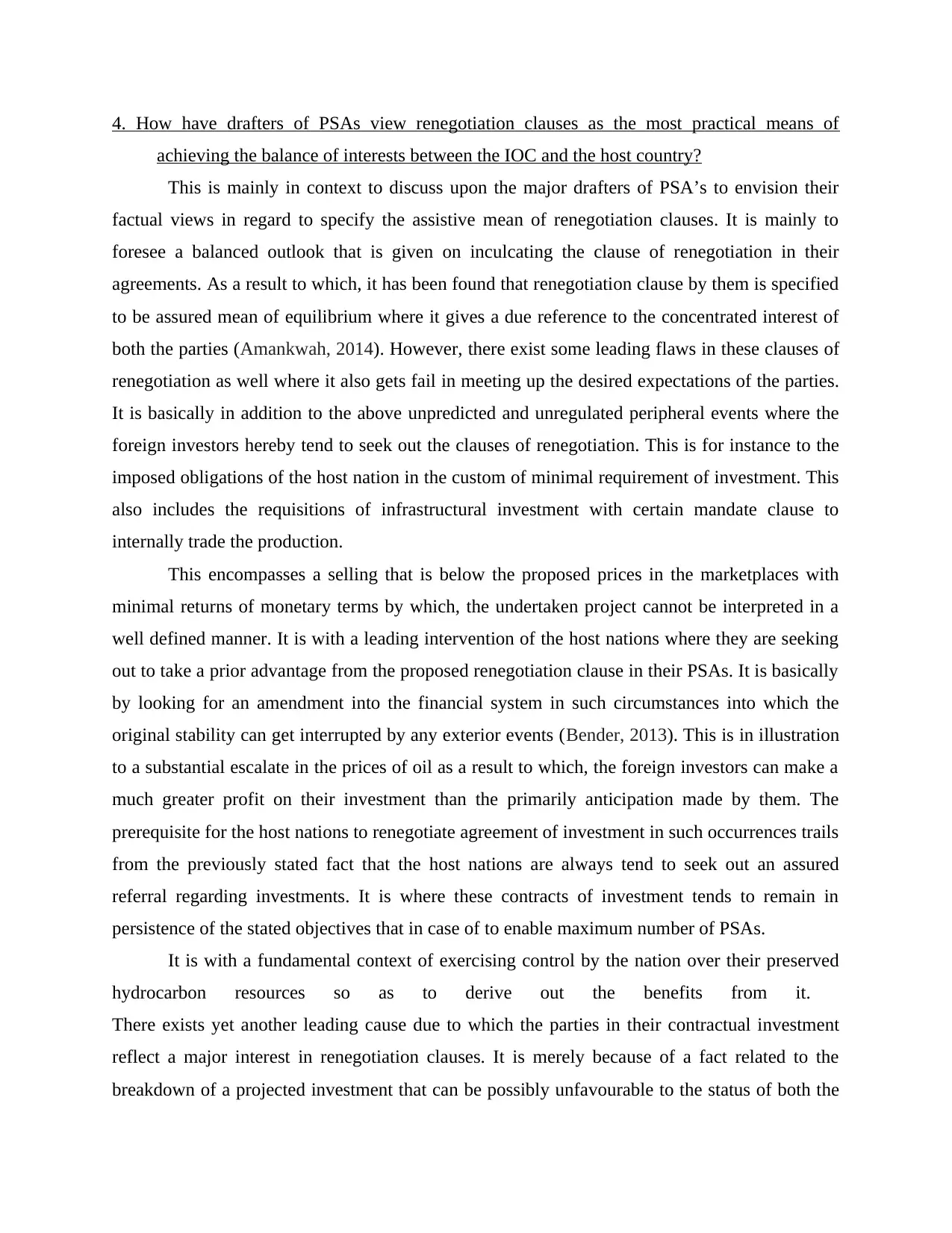
4. How have drafters of PSAs view renegotiation clauses as the most practical means of
achieving the balance of interests between the IOC and the host country?
This is mainly in context to discuss upon the major drafters of PSA’s to envision their
factual views in regard to specify the assistive mean of renegotiation clauses. It is mainly to
foresee a balanced outlook that is given on inculcating the clause of renegotiation in their
agreements. As a result to which, it has been found that renegotiation clause by them is specified
to be assured mean of equilibrium where it gives a due reference to the concentrated interest of
both the parties (Amankwah, 2014). However, there exist some leading flaws in these clauses of
renegotiation as well where it also gets fail in meeting up the desired expectations of the parties.
It is basically in addition to the above unpredicted and unregulated peripheral events where the
foreign investors hereby tend to seek out the clauses of renegotiation. This is for instance to the
imposed obligations of the host nation in the custom of minimal requirement of investment. This
also includes the requisitions of infrastructural investment with certain mandate clause to
internally trade the production.
This encompasses a selling that is below the proposed prices in the marketplaces with
minimal returns of monetary terms by which, the undertaken project cannot be interpreted in a
well defined manner. It is with a leading intervention of the host nations where they are seeking
out to take a prior advantage from the proposed renegotiation clause in their PSAs. It is basically
by looking for an amendment into the financial system in such circumstances into which the
original stability can get interrupted by any exterior events (Bender, 2013). This is in illustration
to a substantial escalate in the prices of oil as a result to which, the foreign investors can make a
much greater profit on their investment than the primarily anticipation made by them. The
prerequisite for the host nations to renegotiate agreement of investment in such occurrences trails
from the previously stated fact that the host nations are always tend to seek out an assured
referral regarding investments. It is where these contracts of investment tends to remain in
persistence of the stated objectives that in case of to enable maximum number of PSAs.
It is with a fundamental context of exercising control by the nation over their preserved
hydrocarbon resources so as to derive out the benefits from it.
There exists yet another leading cause due to which the parties in their contractual investment
reflect a major interest in renegotiation clauses. It is merely because of a fact related to the
breakdown of a projected investment that can be possibly unfavourable to the status of both the
achieving the balance of interests between the IOC and the host country?
This is mainly in context to discuss upon the major drafters of PSA’s to envision their
factual views in regard to specify the assistive mean of renegotiation clauses. It is mainly to
foresee a balanced outlook that is given on inculcating the clause of renegotiation in their
agreements. As a result to which, it has been found that renegotiation clause by them is specified
to be assured mean of equilibrium where it gives a due reference to the concentrated interest of
both the parties (Amankwah, 2014). However, there exist some leading flaws in these clauses of
renegotiation as well where it also gets fail in meeting up the desired expectations of the parties.
It is basically in addition to the above unpredicted and unregulated peripheral events where the
foreign investors hereby tend to seek out the clauses of renegotiation. This is for instance to the
imposed obligations of the host nation in the custom of minimal requirement of investment. This
also includes the requisitions of infrastructural investment with certain mandate clause to
internally trade the production.
This encompasses a selling that is below the proposed prices in the marketplaces with
minimal returns of monetary terms by which, the undertaken project cannot be interpreted in a
well defined manner. It is with a leading intervention of the host nations where they are seeking
out to take a prior advantage from the proposed renegotiation clause in their PSAs. It is basically
by looking for an amendment into the financial system in such circumstances into which the
original stability can get interrupted by any exterior events (Bender, 2013). This is in illustration
to a substantial escalate in the prices of oil as a result to which, the foreign investors can make a
much greater profit on their investment than the primarily anticipation made by them. The
prerequisite for the host nations to renegotiate agreement of investment in such occurrences trails
from the previously stated fact that the host nations are always tend to seek out an assured
referral regarding investments. It is where these contracts of investment tends to remain in
persistence of the stated objectives that in case of to enable maximum number of PSAs.
It is with a fundamental context of exercising control by the nation over their preserved
hydrocarbon resources so as to derive out the benefits from it.
There exists yet another leading cause due to which the parties in their contractual investment
reflect a major interest in renegotiation clauses. It is merely because of a fact related to the
breakdown of a projected investment that can be possibly unfavourable to the status of both the
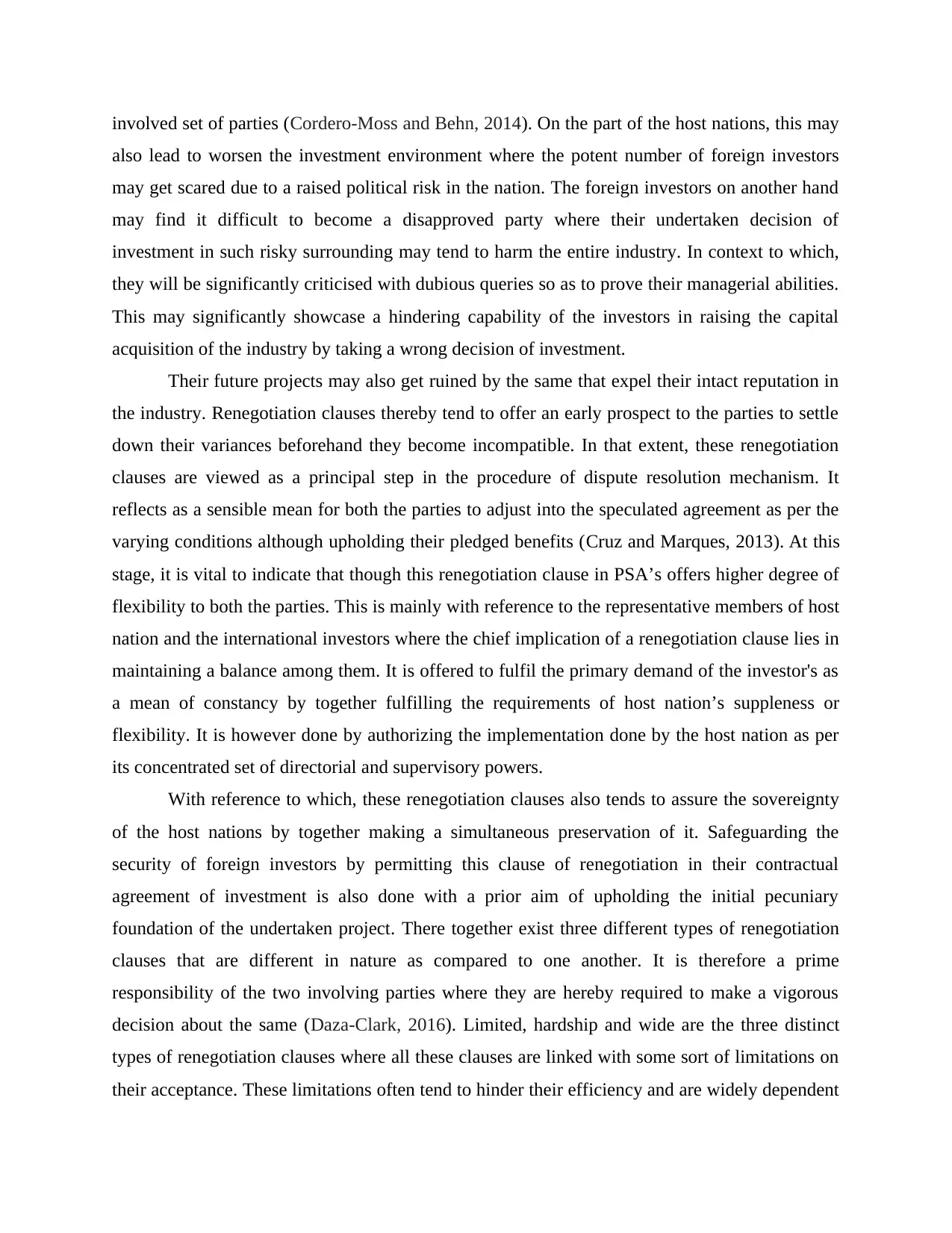
involved set of parties (Cordero-Moss and Behn, 2014). On the part of the host nations, this may
also lead to worsen the investment environment where the potent number of foreign investors
may get scared due to a raised political risk in the nation. The foreign investors on another hand
may find it difficult to become a disapproved party where their undertaken decision of
investment in such risky surrounding may tend to harm the entire industry. In context to which,
they will be significantly criticised with dubious queries so as to prove their managerial abilities.
This may significantly showcase a hindering capability of the investors in raising the capital
acquisition of the industry by taking a wrong decision of investment.
Their future projects may also get ruined by the same that expel their intact reputation in
the industry. Renegotiation clauses thereby tend to offer an early prospect to the parties to settle
down their variances beforehand they become incompatible. In that extent, these renegotiation
clauses are viewed as a principal step in the procedure of dispute resolution mechanism. It
reflects as a sensible mean for both the parties to adjust into the speculated agreement as per the
varying conditions although upholding their pledged benefits (Cruz and Marques, 2013). At this
stage, it is vital to indicate that though this renegotiation clause in PSA’s offers higher degree of
flexibility to both the parties. This is mainly with reference to the representative members of host
nation and the international investors where the chief implication of a renegotiation clause lies in
maintaining a balance among them. It is offered to fulfil the primary demand of the investor's as
a mean of constancy by together fulfilling the requirements of host nation’s suppleness or
flexibility. It is however done by authorizing the implementation done by the host nation as per
its concentrated set of directorial and supervisory powers.
With reference to which, these renegotiation clauses also tends to assure the sovereignty
of the host nations by together making a simultaneous preservation of it. Safeguarding the
security of foreign investors by permitting this clause of renegotiation in their contractual
agreement of investment is also done with a prior aim of upholding the initial pecuniary
foundation of the undertaken project. There together exist three different types of renegotiation
clauses that are different in nature as compared to one another. It is therefore a prime
responsibility of the two involving parties where they are hereby required to make a vigorous
decision about the same (Daza-Clark, 2016). Limited, hardship and wide are the three distinct
types of renegotiation clauses where all these clauses are linked with some sort of limitations on
their acceptance. These limitations often tend to hinder their efficiency and are widely dependent
also lead to worsen the investment environment where the potent number of foreign investors
may get scared due to a raised political risk in the nation. The foreign investors on another hand
may find it difficult to become a disapproved party where their undertaken decision of
investment in such risky surrounding may tend to harm the entire industry. In context to which,
they will be significantly criticised with dubious queries so as to prove their managerial abilities.
This may significantly showcase a hindering capability of the investors in raising the capital
acquisition of the industry by taking a wrong decision of investment.
Their future projects may also get ruined by the same that expel their intact reputation in
the industry. Renegotiation clauses thereby tend to offer an early prospect to the parties to settle
down their variances beforehand they become incompatible. In that extent, these renegotiation
clauses are viewed as a principal step in the procedure of dispute resolution mechanism. It
reflects as a sensible mean for both the parties to adjust into the speculated agreement as per the
varying conditions although upholding their pledged benefits (Cruz and Marques, 2013). At this
stage, it is vital to indicate that though this renegotiation clause in PSA’s offers higher degree of
flexibility to both the parties. This is mainly with reference to the representative members of host
nation and the international investors where the chief implication of a renegotiation clause lies in
maintaining a balance among them. It is offered to fulfil the primary demand of the investor's as
a mean of constancy by together fulfilling the requirements of host nation’s suppleness or
flexibility. It is however done by authorizing the implementation done by the host nation as per
its concentrated set of directorial and supervisory powers.
With reference to which, these renegotiation clauses also tends to assure the sovereignty
of the host nations by together making a simultaneous preservation of it. Safeguarding the
security of foreign investors by permitting this clause of renegotiation in their contractual
agreement of investment is also done with a prior aim of upholding the initial pecuniary
foundation of the undertaken project. There together exist three different types of renegotiation
clauses that are different in nature as compared to one another. It is therefore a prime
responsibility of the two involving parties where they are hereby required to make a vigorous
decision about the same (Daza-Clark, 2016). Limited, hardship and wide are the three distinct
types of renegotiation clauses where all these clauses are linked with some sort of limitations on
their acceptance. These limitations often tend to hinder their efficiency and are widely dependent
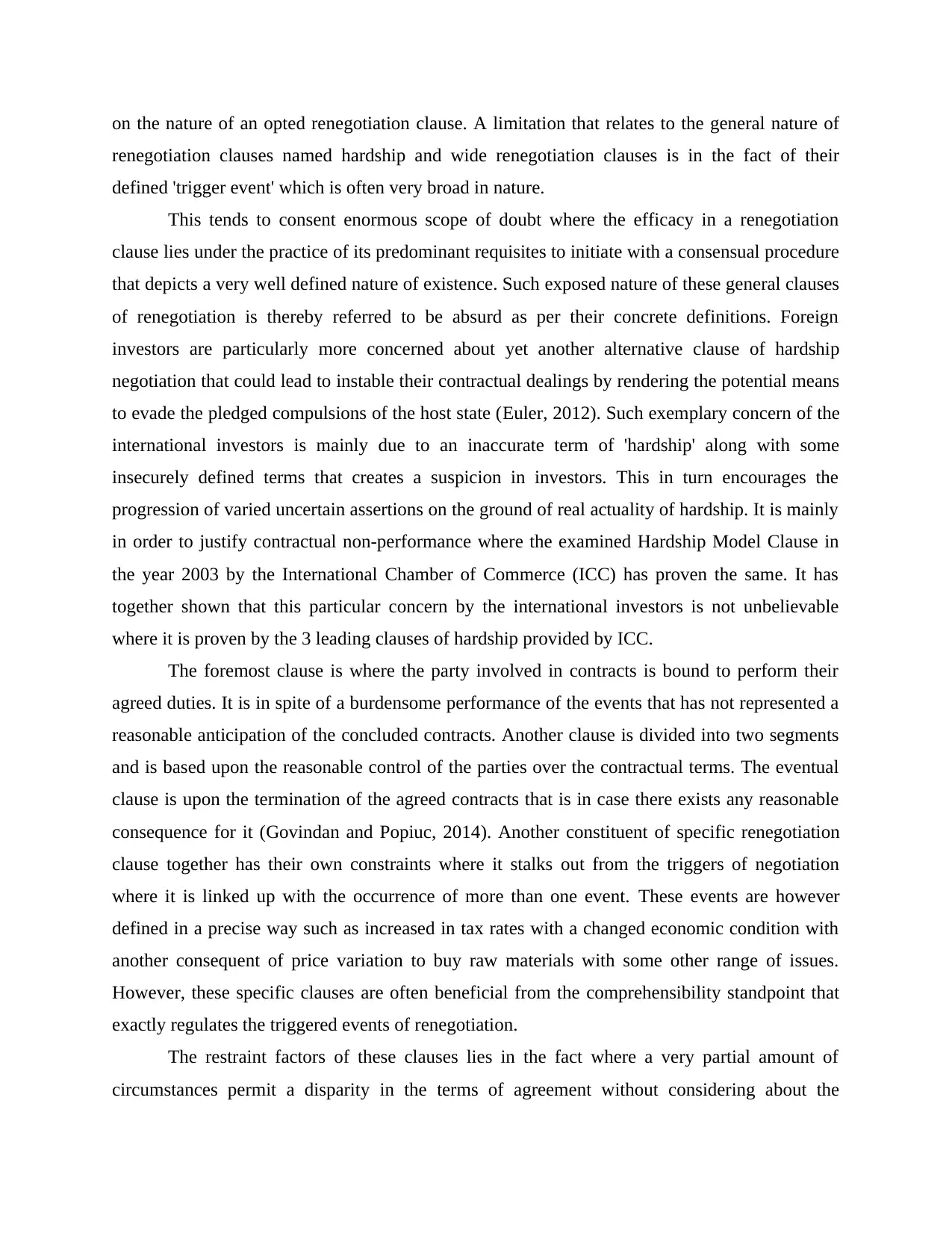
on the nature of an opted renegotiation clause. A limitation that relates to the general nature of
renegotiation clauses named hardship and wide renegotiation clauses is in the fact of their
defined 'trigger event' which is often very broad in nature.
This tends to consent enormous scope of doubt where the efficacy in a renegotiation
clause lies under the practice of its predominant requisites to initiate with a consensual procedure
that depicts a very well defined nature of existence. Such exposed nature of these general clauses
of renegotiation is thereby referred to be absurd as per their concrete definitions. Foreign
investors are particularly more concerned about yet another alternative clause of hardship
negotiation that could lead to instable their contractual dealings by rendering the potential means
to evade the pledged compulsions of the host state (Euler, 2012). Such exemplary concern of the
international investors is mainly due to an inaccurate term of 'hardship' along with some
insecurely defined terms that creates a suspicion in investors. This in turn encourages the
progression of varied uncertain assertions on the ground of real actuality of hardship. It is mainly
in order to justify contractual non-performance where the examined Hardship Model Clause in
the year 2003 by the International Chamber of Commerce (ICC) has proven the same. It has
together shown that this particular concern by the international investors is not unbelievable
where it is proven by the 3 leading clauses of hardship provided by ICC.
The foremost clause is where the party involved in contracts is bound to perform their
agreed duties. It is in spite of a burdensome performance of the events that has not represented a
reasonable anticipation of the concluded contracts. Another clause is divided into two segments
and is based upon the reasonable control of the parties over the contractual terms. The eventual
clause is upon the termination of the agreed contracts that is in case there exists any reasonable
consequence for it (Govindan and Popiuc, 2014). Another constituent of specific renegotiation
clause together has their own constraints where it stalks out from the triggers of negotiation
where it is linked up with the occurrence of more than one event. These events are however
defined in a precise way such as increased in tax rates with a changed economic condition with
another consequent of price variation to buy raw materials with some other range of issues.
However, these specific clauses are often beneficial from the comprehensibility standpoint that
exactly regulates the triggered events of renegotiation.
The restraint factors of these clauses lies in the fact where a very partial amount of
circumstances permit a disparity in the terms of agreement without considering about the
renegotiation clauses named hardship and wide renegotiation clauses is in the fact of their
defined 'trigger event' which is often very broad in nature.
This tends to consent enormous scope of doubt where the efficacy in a renegotiation
clause lies under the practice of its predominant requisites to initiate with a consensual procedure
that depicts a very well defined nature of existence. Such exposed nature of these general clauses
of renegotiation is thereby referred to be absurd as per their concrete definitions. Foreign
investors are particularly more concerned about yet another alternative clause of hardship
negotiation that could lead to instable their contractual dealings by rendering the potential means
to evade the pledged compulsions of the host state (Euler, 2012). Such exemplary concern of the
international investors is mainly due to an inaccurate term of 'hardship' along with some
insecurely defined terms that creates a suspicion in investors. This in turn encourages the
progression of varied uncertain assertions on the ground of real actuality of hardship. It is mainly
in order to justify contractual non-performance where the examined Hardship Model Clause in
the year 2003 by the International Chamber of Commerce (ICC) has proven the same. It has
together shown that this particular concern by the international investors is not unbelievable
where it is proven by the 3 leading clauses of hardship provided by ICC.
The foremost clause is where the party involved in contracts is bound to perform their
agreed duties. It is in spite of a burdensome performance of the events that has not represented a
reasonable anticipation of the concluded contracts. Another clause is divided into two segments
and is based upon the reasonable control of the parties over the contractual terms. The eventual
clause is upon the termination of the agreed contracts that is in case there exists any reasonable
consequence for it (Govindan and Popiuc, 2014). Another constituent of specific renegotiation
clause together has their own constraints where it stalks out from the triggers of negotiation
where it is linked up with the occurrence of more than one event. These events are however
defined in a precise way such as increased in tax rates with a changed economic condition with
another consequent of price variation to buy raw materials with some other range of issues.
However, these specific clauses are often beneficial from the comprehensibility standpoint that
exactly regulates the triggered events of renegotiation.
The restraint factors of these clauses lies in the fact where a very partial amount of
circumstances permit a disparity in the terms of agreement without considering about the
Paraphrase This Document
Need a fresh take? Get an instant paraphrase of this document with our AI Paraphraser
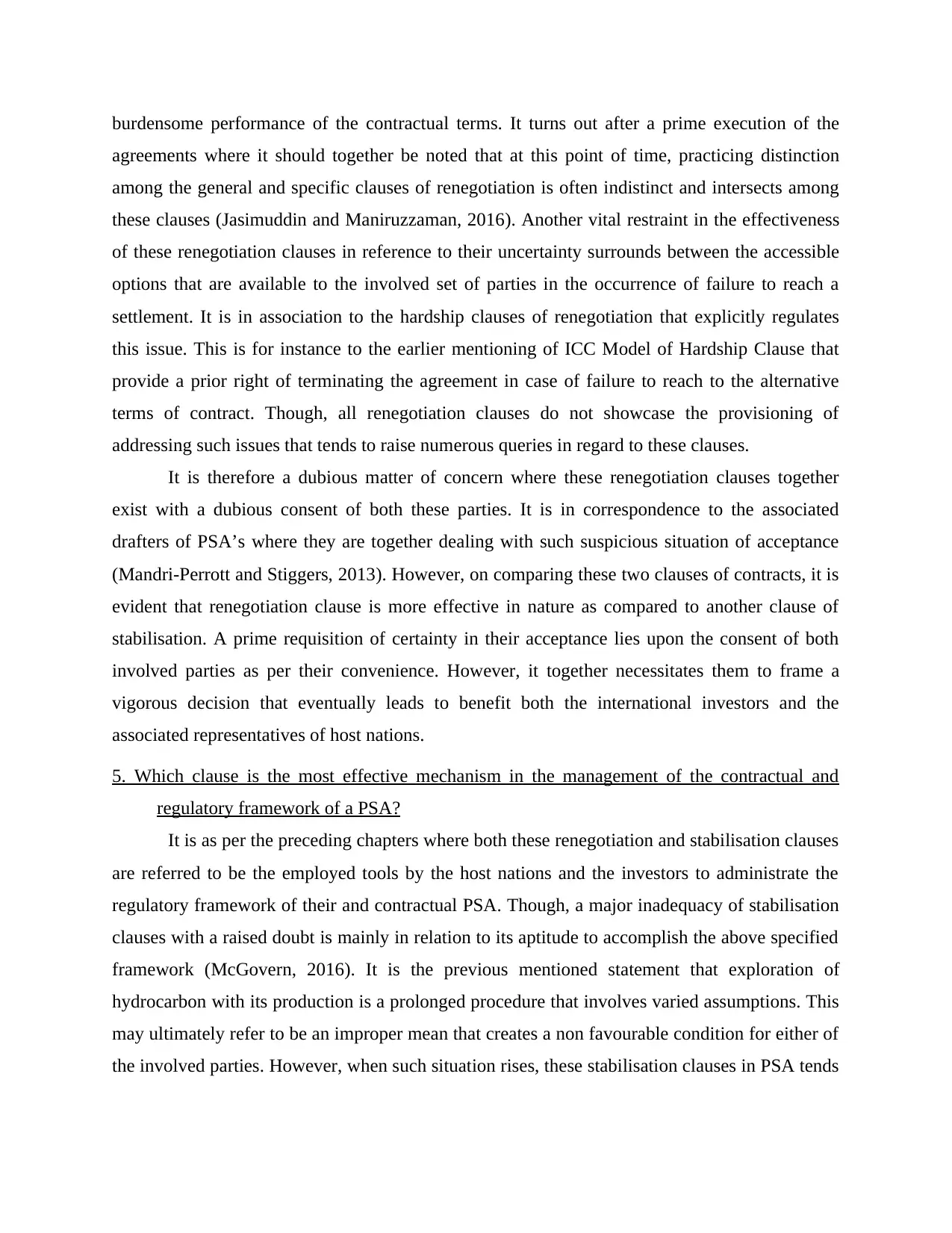
burdensome performance of the contractual terms. It turns out after a prime execution of the
agreements where it should together be noted that at this point of time, practicing distinction
among the general and specific clauses of renegotiation is often indistinct and intersects among
these clauses (Jasimuddin and Maniruzzaman, 2016). Another vital restraint in the effectiveness
of these renegotiation clauses in reference to their uncertainty surrounds between the accessible
options that are available to the involved set of parties in the occurrence of failure to reach a
settlement. It is in association to the hardship clauses of renegotiation that explicitly regulates
this issue. This is for instance to the earlier mentioning of ICC Model of Hardship Clause that
provide a prior right of terminating the agreement in case of failure to reach to the alternative
terms of contract. Though, all renegotiation clauses do not showcase the provisioning of
addressing such issues that tends to raise numerous queries in regard to these clauses.
It is therefore a dubious matter of concern where these renegotiation clauses together
exist with a dubious consent of both these parties. It is in correspondence to the associated
drafters of PSA’s where they are together dealing with such suspicious situation of acceptance
(Mandri-Perrott and Stiggers, 2013). However, on comparing these two clauses of contracts, it is
evident that renegotiation clause is more effective in nature as compared to another clause of
stabilisation. A prime requisition of certainty in their acceptance lies upon the consent of both
involved parties as per their convenience. However, it together necessitates them to frame a
vigorous decision that eventually leads to benefit both the international investors and the
associated representatives of host nations.
5. Which clause is the most effective mechanism in the management of the contractual and
regulatory framework of a PSA?
It is as per the preceding chapters where both these renegotiation and stabilisation clauses
are referred to be the employed tools by the host nations and the investors to administrate the
regulatory framework of their and contractual PSA. Though, a major inadequacy of stabilisation
clauses with a raised doubt is mainly in relation to its aptitude to accomplish the above specified
framework (McGovern, 2016). It is the previous mentioned statement that exploration of
hydrocarbon with its production is a prolonged procedure that involves varied assumptions. This
may ultimately refer to be an improper mean that creates a non favourable condition for either of
the involved parties. However, when such situation rises, these stabilisation clauses in PSA tends
agreements where it should together be noted that at this point of time, practicing distinction
among the general and specific clauses of renegotiation is often indistinct and intersects among
these clauses (Jasimuddin and Maniruzzaman, 2016). Another vital restraint in the effectiveness
of these renegotiation clauses in reference to their uncertainty surrounds between the accessible
options that are available to the involved set of parties in the occurrence of failure to reach a
settlement. It is in association to the hardship clauses of renegotiation that explicitly regulates
this issue. This is for instance to the earlier mentioning of ICC Model of Hardship Clause that
provide a prior right of terminating the agreement in case of failure to reach to the alternative
terms of contract. Though, all renegotiation clauses do not showcase the provisioning of
addressing such issues that tends to raise numerous queries in regard to these clauses.
It is therefore a dubious matter of concern where these renegotiation clauses together
exist with a dubious consent of both these parties. It is in correspondence to the associated
drafters of PSA’s where they are together dealing with such suspicious situation of acceptance
(Mandri-Perrott and Stiggers, 2013). However, on comparing these two clauses of contracts, it is
evident that renegotiation clause is more effective in nature as compared to another clause of
stabilisation. A prime requisition of certainty in their acceptance lies upon the consent of both
involved parties as per their convenience. However, it together necessitates them to frame a
vigorous decision that eventually leads to benefit both the international investors and the
associated representatives of host nations.
5. Which clause is the most effective mechanism in the management of the contractual and
regulatory framework of a PSA?
It is as per the preceding chapters where both these renegotiation and stabilisation clauses
are referred to be the employed tools by the host nations and the investors to administrate the
regulatory framework of their and contractual PSA. Though, a major inadequacy of stabilisation
clauses with a raised doubt is mainly in relation to its aptitude to accomplish the above specified
framework (McGovern, 2016). It is the previous mentioned statement that exploration of
hydrocarbon with its production is a prolonged procedure that involves varied assumptions. This
may ultimately refer to be an improper mean that creates a non favourable condition for either of
the involved parties. However, when such situation rises, these stabilisation clauses in PSA tends
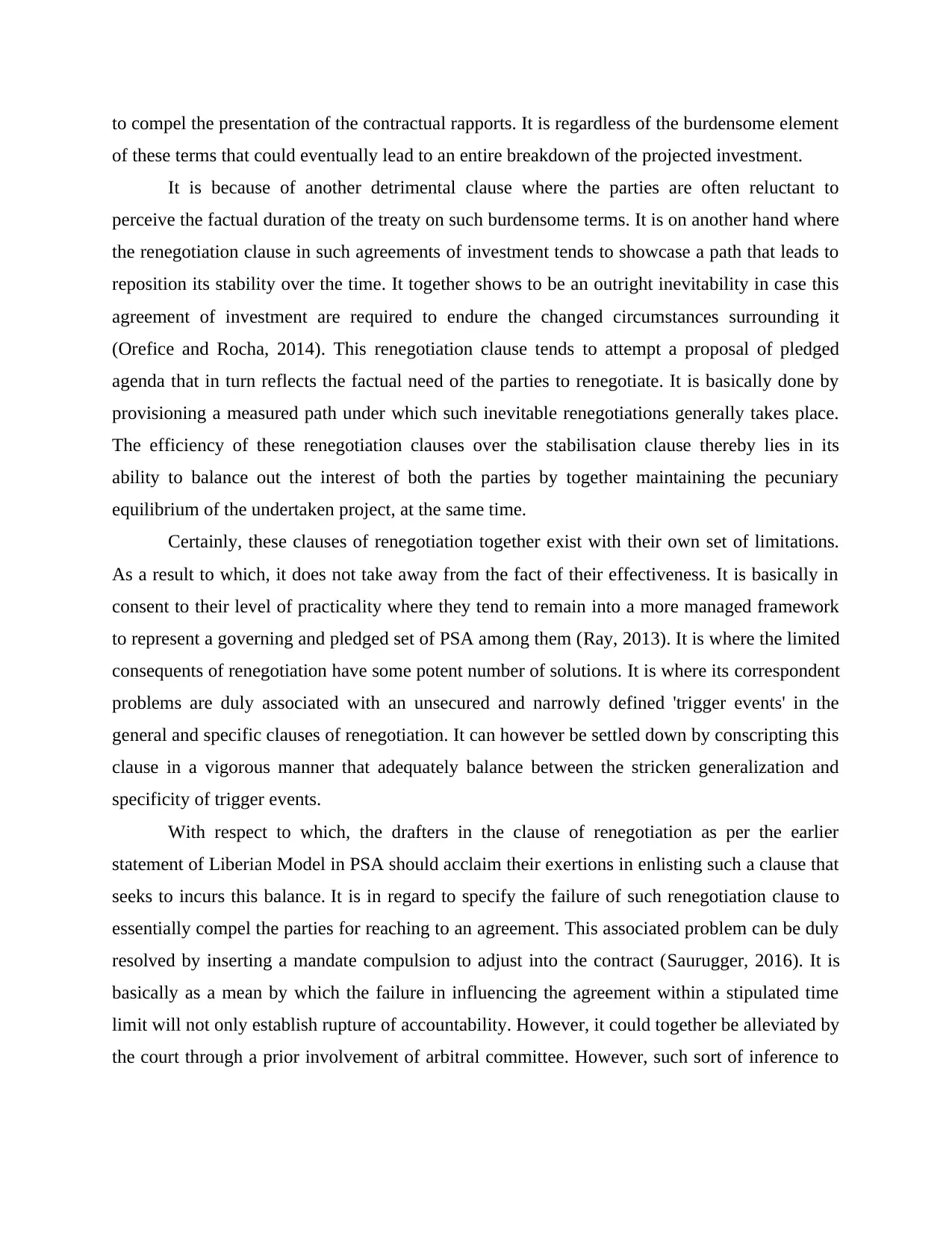
to compel the presentation of the contractual rapports. It is regardless of the burdensome element
of these terms that could eventually lead to an entire breakdown of the projected investment.
It is because of another detrimental clause where the parties are often reluctant to
perceive the factual duration of the treaty on such burdensome terms. It is on another hand where
the renegotiation clause in such agreements of investment tends to showcase a path that leads to
reposition its stability over the time. It together shows to be an outright inevitability in case this
agreement of investment are required to endure the changed circumstances surrounding it
(Orefice and Rocha, 2014). This renegotiation clause tends to attempt a proposal of pledged
agenda that in turn reflects the factual need of the parties to renegotiate. It is basically done by
provisioning a measured path under which such inevitable renegotiations generally takes place.
The efficiency of these renegotiation clauses over the stabilisation clause thereby lies in its
ability to balance out the interest of both the parties by together maintaining the pecuniary
equilibrium of the undertaken project, at the same time.
Certainly, these clauses of renegotiation together exist with their own set of limitations.
As a result to which, it does not take away from the fact of their effectiveness. It is basically in
consent to their level of practicality where they tend to remain into a more managed framework
to represent a governing and pledged set of PSA among them (Ray, 2013). It is where the limited
consequents of renegotiation have some potent number of solutions. It is where its correspondent
problems are duly associated with an unsecured and narrowly defined 'trigger events' in the
general and specific clauses of renegotiation. It can however be settled down by conscripting this
clause in a vigorous manner that adequately balance between the stricken generalization and
specificity of trigger events.
With respect to which, the drafters in the clause of renegotiation as per the earlier
statement of Liberian Model in PSA should acclaim their exertions in enlisting such a clause that
seeks to incurs this balance. It is in regard to specify the failure of such renegotiation clause to
essentially compel the parties for reaching to an agreement. This associated problem can be duly
resolved by inserting a mandate compulsion to adjust into the contract (Saurugger, 2016). It is
basically as a mean by which the failure in influencing the agreement within a stipulated time
limit will not only establish rupture of accountability. However, it could together be alleviated by
the court through a prior involvement of arbitral committee. However, such sort of inference to
of these terms that could eventually lead to an entire breakdown of the projected investment.
It is because of another detrimental clause where the parties are often reluctant to
perceive the factual duration of the treaty on such burdensome terms. It is on another hand where
the renegotiation clause in such agreements of investment tends to showcase a path that leads to
reposition its stability over the time. It together shows to be an outright inevitability in case this
agreement of investment are required to endure the changed circumstances surrounding it
(Orefice and Rocha, 2014). This renegotiation clause tends to attempt a proposal of pledged
agenda that in turn reflects the factual need of the parties to renegotiate. It is basically done by
provisioning a measured path under which such inevitable renegotiations generally takes place.
The efficiency of these renegotiation clauses over the stabilisation clause thereby lies in its
ability to balance out the interest of both the parties by together maintaining the pecuniary
equilibrium of the undertaken project, at the same time.
Certainly, these clauses of renegotiation together exist with their own set of limitations.
As a result to which, it does not take away from the fact of their effectiveness. It is basically in
consent to their level of practicality where they tend to remain into a more managed framework
to represent a governing and pledged set of PSA among them (Ray, 2013). It is where the limited
consequents of renegotiation have some potent number of solutions. It is where its correspondent
problems are duly associated with an unsecured and narrowly defined 'trigger events' in the
general and specific clauses of renegotiation. It can however be settled down by conscripting this
clause in a vigorous manner that adequately balance between the stricken generalization and
specificity of trigger events.
With respect to which, the drafters in the clause of renegotiation as per the earlier
statement of Liberian Model in PSA should acclaim their exertions in enlisting such a clause that
seeks to incurs this balance. It is in regard to specify the failure of such renegotiation clause to
essentially compel the parties for reaching to an agreement. This associated problem can be duly
resolved by inserting a mandate compulsion to adjust into the contract (Saurugger, 2016). It is
basically as a mean by which the failure in influencing the agreement within a stipulated time
limit will not only establish rupture of accountability. However, it could together be alleviated by
the court through a prior involvement of arbitral committee. However, such sort of inference to
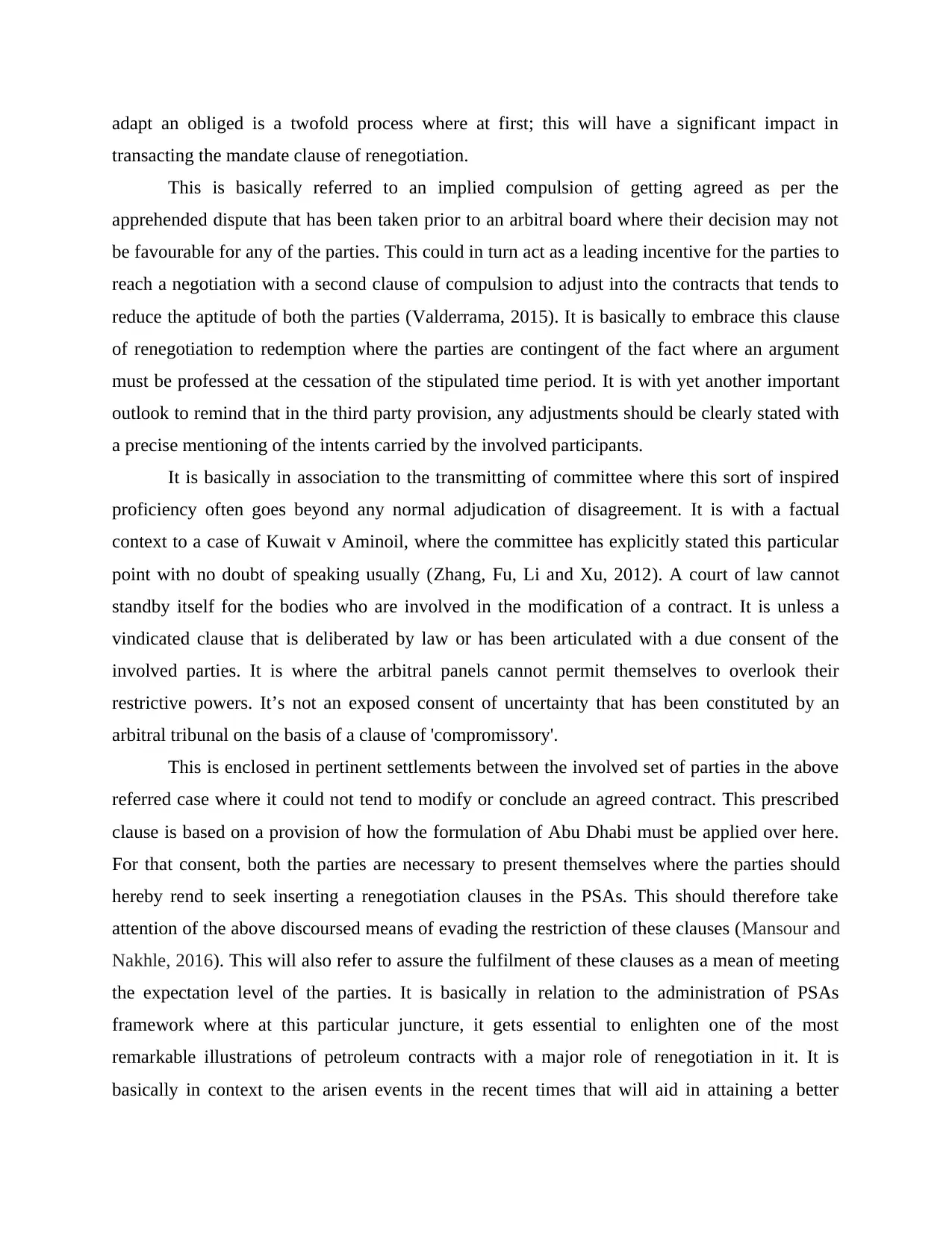
adapt an obliged is a twofold process where at first; this will have a significant impact in
transacting the mandate clause of renegotiation.
This is basically referred to an implied compulsion of getting agreed as per the
apprehended dispute that has been taken prior to an arbitral board where their decision may not
be favourable for any of the parties. This could in turn act as a leading incentive for the parties to
reach a negotiation with a second clause of compulsion to adjust into the contracts that tends to
reduce the aptitude of both the parties (Valderrama, 2015). It is basically to embrace this clause
of renegotiation to redemption where the parties are contingent of the fact where an argument
must be professed at the cessation of the stipulated time period. It is with yet another important
outlook to remind that in the third party provision, any adjustments should be clearly stated with
a precise mentioning of the intents carried by the involved participants.
It is basically in association to the transmitting of committee where this sort of inspired
proficiency often goes beyond any normal adjudication of disagreement. It is with a factual
context to a case of Kuwait v Aminoil, where the committee has explicitly stated this particular
point with no doubt of speaking usually (Zhang, Fu, Li and Xu, 2012). A court of law cannot
standby itself for the bodies who are involved in the modification of a contract. It is unless a
vindicated clause that is deliberated by law or has been articulated with a due consent of the
involved parties. It is where the arbitral panels cannot permit themselves to overlook their
restrictive powers. It’s not an exposed consent of uncertainty that has been constituted by an
arbitral tribunal on the basis of a clause of 'compromissory'.
This is enclosed in pertinent settlements between the involved set of parties in the above
referred case where it could not tend to modify or conclude an agreed contract. This prescribed
clause is based on a provision of how the formulation of Abu Dhabi must be applied over here.
For that consent, both the parties are necessary to present themselves where the parties should
hereby rend to seek inserting a renegotiation clauses in the PSAs. This should therefore take
attention of the above discoursed means of evading the restriction of these clauses (Mansour and
Nakhle, 2016). This will also refer to assure the fulfilment of these clauses as a mean of meeting
the expectation level of the parties. It is basically in relation to the administration of PSAs
framework where at this particular juncture, it gets essential to enlighten one of the most
remarkable illustrations of petroleum contracts with a major role of renegotiation in it. It is
basically in context to the arisen events in the recent times that will aid in attaining a better
transacting the mandate clause of renegotiation.
This is basically referred to an implied compulsion of getting agreed as per the
apprehended dispute that has been taken prior to an arbitral board where their decision may not
be favourable for any of the parties. This could in turn act as a leading incentive for the parties to
reach a negotiation with a second clause of compulsion to adjust into the contracts that tends to
reduce the aptitude of both the parties (Valderrama, 2015). It is basically to embrace this clause
of renegotiation to redemption where the parties are contingent of the fact where an argument
must be professed at the cessation of the stipulated time period. It is with yet another important
outlook to remind that in the third party provision, any adjustments should be clearly stated with
a precise mentioning of the intents carried by the involved participants.
It is basically in association to the transmitting of committee where this sort of inspired
proficiency often goes beyond any normal adjudication of disagreement. It is with a factual
context to a case of Kuwait v Aminoil, where the committee has explicitly stated this particular
point with no doubt of speaking usually (Zhang, Fu, Li and Xu, 2012). A court of law cannot
standby itself for the bodies who are involved in the modification of a contract. It is unless a
vindicated clause that is deliberated by law or has been articulated with a due consent of the
involved parties. It is where the arbitral panels cannot permit themselves to overlook their
restrictive powers. It’s not an exposed consent of uncertainty that has been constituted by an
arbitral tribunal on the basis of a clause of 'compromissory'.
This is enclosed in pertinent settlements between the involved set of parties in the above
referred case where it could not tend to modify or conclude an agreed contract. This prescribed
clause is based on a provision of how the formulation of Abu Dhabi must be applied over here.
For that consent, both the parties are necessary to present themselves where the parties should
hereby rend to seek inserting a renegotiation clauses in the PSAs. This should therefore take
attention of the above discoursed means of evading the restriction of these clauses (Mansour and
Nakhle, 2016). This will also refer to assure the fulfilment of these clauses as a mean of meeting
the expectation level of the parties. It is basically in relation to the administration of PSAs
framework where at this particular juncture, it gets essential to enlighten one of the most
remarkable illustrations of petroleum contracts with a major role of renegotiation in it. It is
basically in context to the arisen events in the recent times that will aid in attaining a better
Secure Best Marks with AI Grader
Need help grading? Try our AI Grader for instant feedback on your assignments.
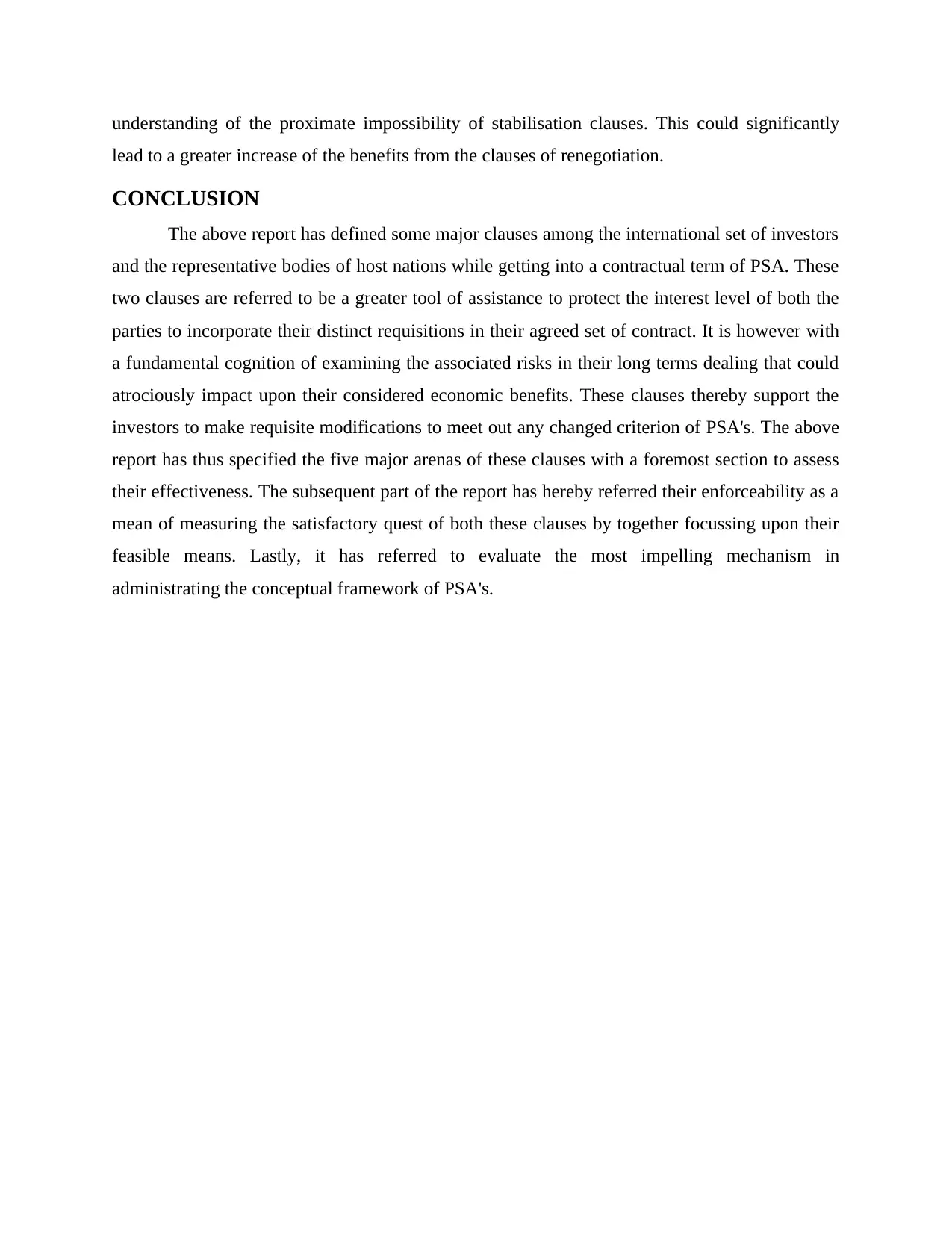
understanding of the proximate impossibility of stabilisation clauses. This could significantly
lead to a greater increase of the benefits from the clauses of renegotiation.
CONCLUSION
The above report has defined some major clauses among the international set of investors
and the representative bodies of host nations while getting into a contractual term of PSA. These
two clauses are referred to be a greater tool of assistance to protect the interest level of both the
parties to incorporate their distinct requisitions in their agreed set of contract. It is however with
a fundamental cognition of examining the associated risks in their long terms dealing that could
atrociously impact upon their considered economic benefits. These clauses thereby support the
investors to make requisite modifications to meet out any changed criterion of PSA's. The above
report has thus specified the five major arenas of these clauses with a foremost section to assess
their effectiveness. The subsequent part of the report has hereby referred their enforceability as a
mean of measuring the satisfactory quest of both these clauses by together focussing upon their
feasible means. Lastly, it has referred to evaluate the most impelling mechanism in
administrating the conceptual framework of PSA's.
lead to a greater increase of the benefits from the clauses of renegotiation.
CONCLUSION
The above report has defined some major clauses among the international set of investors
and the representative bodies of host nations while getting into a contractual term of PSA. These
two clauses are referred to be a greater tool of assistance to protect the interest level of both the
parties to incorporate their distinct requisitions in their agreed set of contract. It is however with
a fundamental cognition of examining the associated risks in their long terms dealing that could
atrociously impact upon their considered economic benefits. These clauses thereby support the
investors to make requisite modifications to meet out any changed criterion of PSA's. The above
report has thus specified the five major arenas of these clauses with a foremost section to assess
their effectiveness. The subsequent part of the report has hereby referred their enforceability as a
mean of measuring the satisfactory quest of both these clauses by together focussing upon their
feasible means. Lastly, it has referred to evaluate the most impelling mechanism in
administrating the conceptual framework of PSA's.
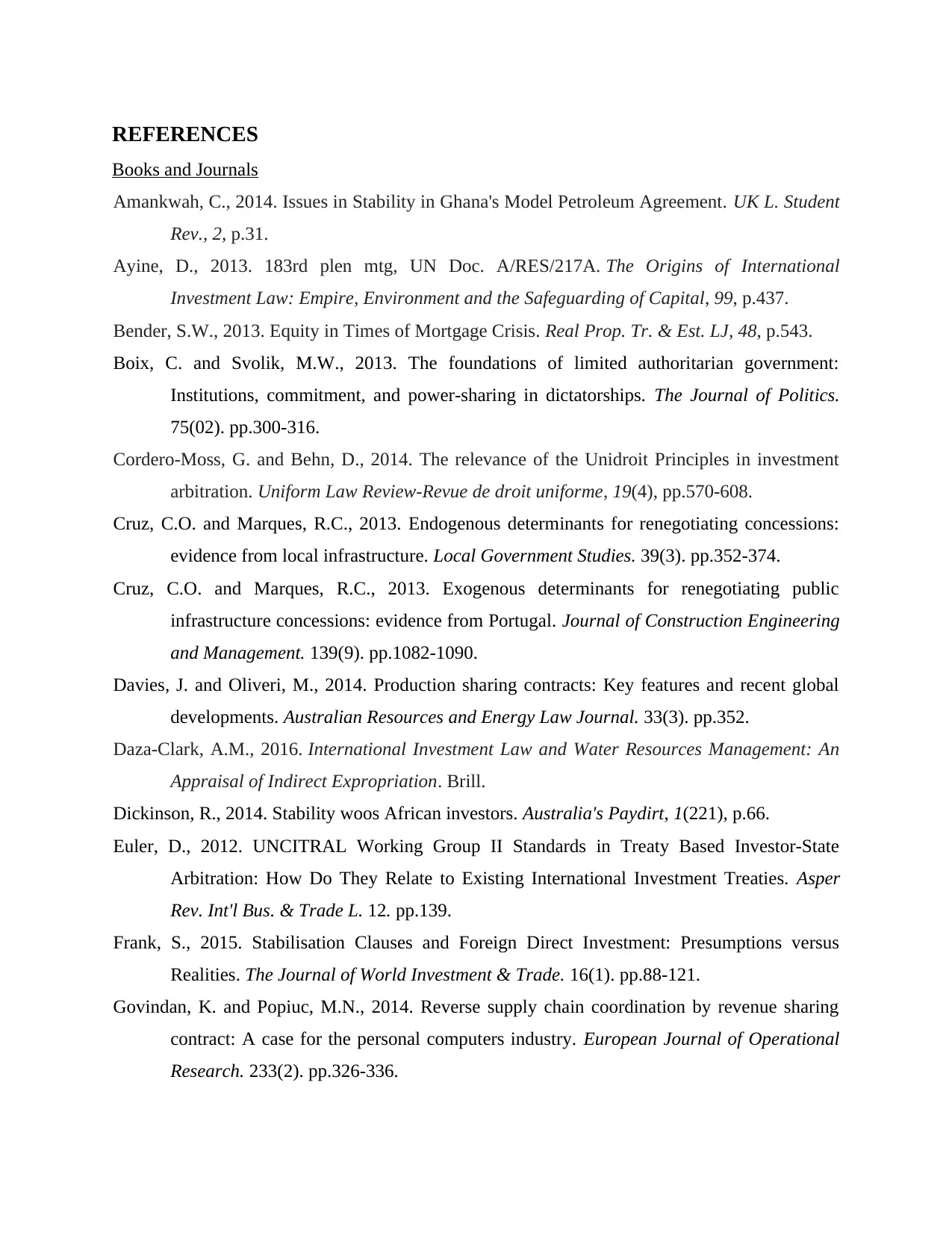
REFERENCES
Books and Journals
Amankwah, C., 2014. Issues in Stability in Ghana's Model Petroleum Agreement. UK L. Student
Rev., 2, p.31.
Ayine, D., 2013. 183rd plen mtg, UN Doc. A/RES/217A. The Origins of International
Investment Law: Empire, Environment and the Safeguarding of Capital, 99, p.437.
Bender, S.W., 2013. Equity in Times of Mortgage Crisis. Real Prop. Tr. & Est. LJ, 48, p.543.
Boix, C. and Svolik, M.W., 2013. The foundations of limited authoritarian government:
Institutions, commitment, and power-sharing in dictatorships. The Journal of Politics.
75(02). pp.300-316.
Cordero-Moss, G. and Behn, D., 2014. The relevance of the Unidroit Principles in investment
arbitration. Uniform Law Review-Revue de droit uniforme, 19(4), pp.570-608.
Cruz, C.O. and Marques, R.C., 2013. Endogenous determinants for renegotiating concessions:
evidence from local infrastructure. Local Government Studies. 39(3). pp.352-374.
Cruz, C.O. and Marques, R.C., 2013. Exogenous determinants for renegotiating public
infrastructure concessions: evidence from Portugal. Journal of Construction Engineering
and Management. 139(9). pp.1082-1090.
Davies, J. and Oliveri, M., 2014. Production sharing contracts: Key features and recent global
developments. Australian Resources and Energy Law Journal. 33(3). pp.352.
Daza-Clark, A.M., 2016. International Investment Law and Water Resources Management: An
Appraisal of Indirect Expropriation. Brill.
Dickinson, R., 2014. Stability woos African investors. Australia's Paydirt, 1(221), p.66.
Euler, D., 2012. UNCITRAL Working Group II Standards in Treaty Based Investor-State
Arbitration: How Do They Relate to Existing International Investment Treaties. Asper
Rev. Int'l Bus. & Trade L. 12. pp.139.
Frank, S., 2015. Stabilisation Clauses and Foreign Direct Investment: Presumptions versus
Realities. The Journal of World Investment & Trade. 16(1). pp.88-121.
Govindan, K. and Popiuc, M.N., 2014. Reverse supply chain coordination by revenue sharing
contract: A case for the personal computers industry. European Journal of Operational
Research. 233(2). pp.326-336.
Books and Journals
Amankwah, C., 2014. Issues in Stability in Ghana's Model Petroleum Agreement. UK L. Student
Rev., 2, p.31.
Ayine, D., 2013. 183rd plen mtg, UN Doc. A/RES/217A. The Origins of International
Investment Law: Empire, Environment and the Safeguarding of Capital, 99, p.437.
Bender, S.W., 2013. Equity in Times of Mortgage Crisis. Real Prop. Tr. & Est. LJ, 48, p.543.
Boix, C. and Svolik, M.W., 2013. The foundations of limited authoritarian government:
Institutions, commitment, and power-sharing in dictatorships. The Journal of Politics.
75(02). pp.300-316.
Cordero-Moss, G. and Behn, D., 2014. The relevance of the Unidroit Principles in investment
arbitration. Uniform Law Review-Revue de droit uniforme, 19(4), pp.570-608.
Cruz, C.O. and Marques, R.C., 2013. Endogenous determinants for renegotiating concessions:
evidence from local infrastructure. Local Government Studies. 39(3). pp.352-374.
Cruz, C.O. and Marques, R.C., 2013. Exogenous determinants for renegotiating public
infrastructure concessions: evidence from Portugal. Journal of Construction Engineering
and Management. 139(9). pp.1082-1090.
Davies, J. and Oliveri, M., 2014. Production sharing contracts: Key features and recent global
developments. Australian Resources and Energy Law Journal. 33(3). pp.352.
Daza-Clark, A.M., 2016. International Investment Law and Water Resources Management: An
Appraisal of Indirect Expropriation. Brill.
Dickinson, R., 2014. Stability woos African investors. Australia's Paydirt, 1(221), p.66.
Euler, D., 2012. UNCITRAL Working Group II Standards in Treaty Based Investor-State
Arbitration: How Do They Relate to Existing International Investment Treaties. Asper
Rev. Int'l Bus. & Trade L. 12. pp.139.
Frank, S., 2015. Stabilisation Clauses and Foreign Direct Investment: Presumptions versus
Realities. The Journal of World Investment & Trade. 16(1). pp.88-121.
Govindan, K. and Popiuc, M.N., 2014. Reverse supply chain coordination by revenue sharing
contract: A case for the personal computers industry. European Journal of Operational
Research. 233(2). pp.326-336.
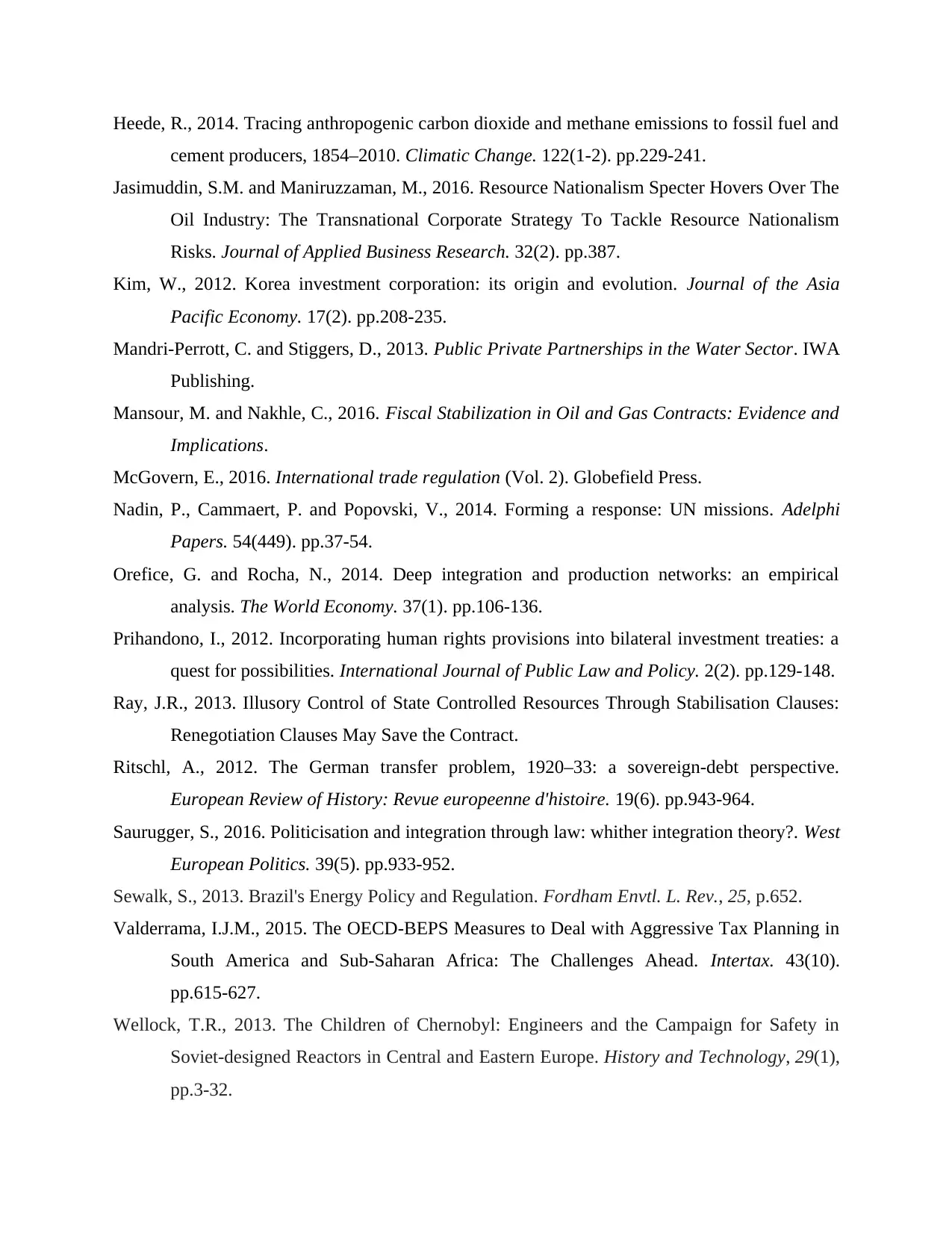
Heede, R., 2014. Tracing anthropogenic carbon dioxide and methane emissions to fossil fuel and
cement producers, 1854–2010. Climatic Change. 122(1-2). pp.229-241.
Jasimuddin, S.M. and Maniruzzaman, M., 2016. Resource Nationalism Specter Hovers Over The
Oil Industry: The Transnational Corporate Strategy To Tackle Resource Nationalism
Risks. Journal of Applied Business Research. 32(2). pp.387.
Kim, W., 2012. Korea investment corporation: its origin and evolution. Journal of the Asia
Pacific Economy. 17(2). pp.208-235.
Mandri-Perrott, C. and Stiggers, D., 2013. Public Private Partnerships in the Water Sector. IWA
Publishing.
Mansour, M. and Nakhle, C., 2016. Fiscal Stabilization in Oil and Gas Contracts: Evidence and
Implications.
McGovern, E., 2016. International trade regulation (Vol. 2). Globefield Press.
Nadin, P., Cammaert, P. and Popovski, V., 2014. Forming a response: UN missions. Adelphi
Papers. 54(449). pp.37-54.
Orefice, G. and Rocha, N., 2014. Deep integration and production networks: an empirical
analysis. The World Economy. 37(1). pp.106-136.
Prihandono, I., 2012. Incorporating human rights provisions into bilateral investment treaties: a
quest for possibilities. International Journal of Public Law and Policy. 2(2). pp.129-148.
Ray, J.R., 2013. Illusory Control of State Controlled Resources Through Stabilisation Clauses:
Renegotiation Clauses May Save the Contract.
Ritschl, A., 2012. The German transfer problem, 1920–33: a sovereign-debt perspective.
European Review of History: Revue europeenne d'histoire. 19(6). pp.943-964.
Saurugger, S., 2016. Politicisation and integration through law: whither integration theory?. West
European Politics. 39(5). pp.933-952.
Sewalk, S., 2013. Brazil's Energy Policy and Regulation. Fordham Envtl. L. Rev., 25, p.652.
Valderrama, I.J.M., 2015. The OECD-BEPS Measures to Deal with Aggressive Tax Planning in
South America and Sub-Saharan Africa: The Challenges Ahead. Intertax. 43(10).
pp.615-627.
Wellock, T.R., 2013. The Children of Chernobyl: Engineers and the Campaign for Safety in
Soviet-designed Reactors in Central and Eastern Europe. History and Technology, 29(1),
pp.3-32.
cement producers, 1854–2010. Climatic Change. 122(1-2). pp.229-241.
Jasimuddin, S.M. and Maniruzzaman, M., 2016. Resource Nationalism Specter Hovers Over The
Oil Industry: The Transnational Corporate Strategy To Tackle Resource Nationalism
Risks. Journal of Applied Business Research. 32(2). pp.387.
Kim, W., 2012. Korea investment corporation: its origin and evolution. Journal of the Asia
Pacific Economy. 17(2). pp.208-235.
Mandri-Perrott, C. and Stiggers, D., 2013. Public Private Partnerships in the Water Sector. IWA
Publishing.
Mansour, M. and Nakhle, C., 2016. Fiscal Stabilization in Oil and Gas Contracts: Evidence and
Implications.
McGovern, E., 2016. International trade regulation (Vol. 2). Globefield Press.
Nadin, P., Cammaert, P. and Popovski, V., 2014. Forming a response: UN missions. Adelphi
Papers. 54(449). pp.37-54.
Orefice, G. and Rocha, N., 2014. Deep integration and production networks: an empirical
analysis. The World Economy. 37(1). pp.106-136.
Prihandono, I., 2012. Incorporating human rights provisions into bilateral investment treaties: a
quest for possibilities. International Journal of Public Law and Policy. 2(2). pp.129-148.
Ray, J.R., 2013. Illusory Control of State Controlled Resources Through Stabilisation Clauses:
Renegotiation Clauses May Save the Contract.
Ritschl, A., 2012. The German transfer problem, 1920–33: a sovereign-debt perspective.
European Review of History: Revue europeenne d'histoire. 19(6). pp.943-964.
Saurugger, S., 2016. Politicisation and integration through law: whither integration theory?. West
European Politics. 39(5). pp.933-952.
Sewalk, S., 2013. Brazil's Energy Policy and Regulation. Fordham Envtl. L. Rev., 25, p.652.
Valderrama, I.J.M., 2015. The OECD-BEPS Measures to Deal with Aggressive Tax Planning in
South America and Sub-Saharan Africa: The Challenges Ahead. Intertax. 43(10).
pp.615-627.
Wellock, T.R., 2013. The Children of Chernobyl: Engineers and the Campaign for Safety in
Soviet-designed Reactors in Central and Eastern Europe. History and Technology, 29(1),
pp.3-32.
Paraphrase This Document
Need a fresh take? Get an instant paraphrase of this document with our AI Paraphraser

Zhang, W.G., Fu, J., Li, H. and Xu, W., 2012. Coordination of supply chain with a revenue-
sharing contract under demand disruptions when retailers compete. International Journal
of Production Economics. 138(1). pp.68-75.
sharing contract under demand disruptions when retailers compete. International Journal
of Production Economics. 138(1). pp.68-75.


1 out of 25
Your All-in-One AI-Powered Toolkit for Academic Success.
+13062052269
info@desklib.com
Available 24*7 on WhatsApp / Email
![[object Object]](/_next/static/media/star-bottom.7253800d.svg)
Unlock your academic potential
© 2024 | Zucol Services PVT LTD | All rights reserved.


